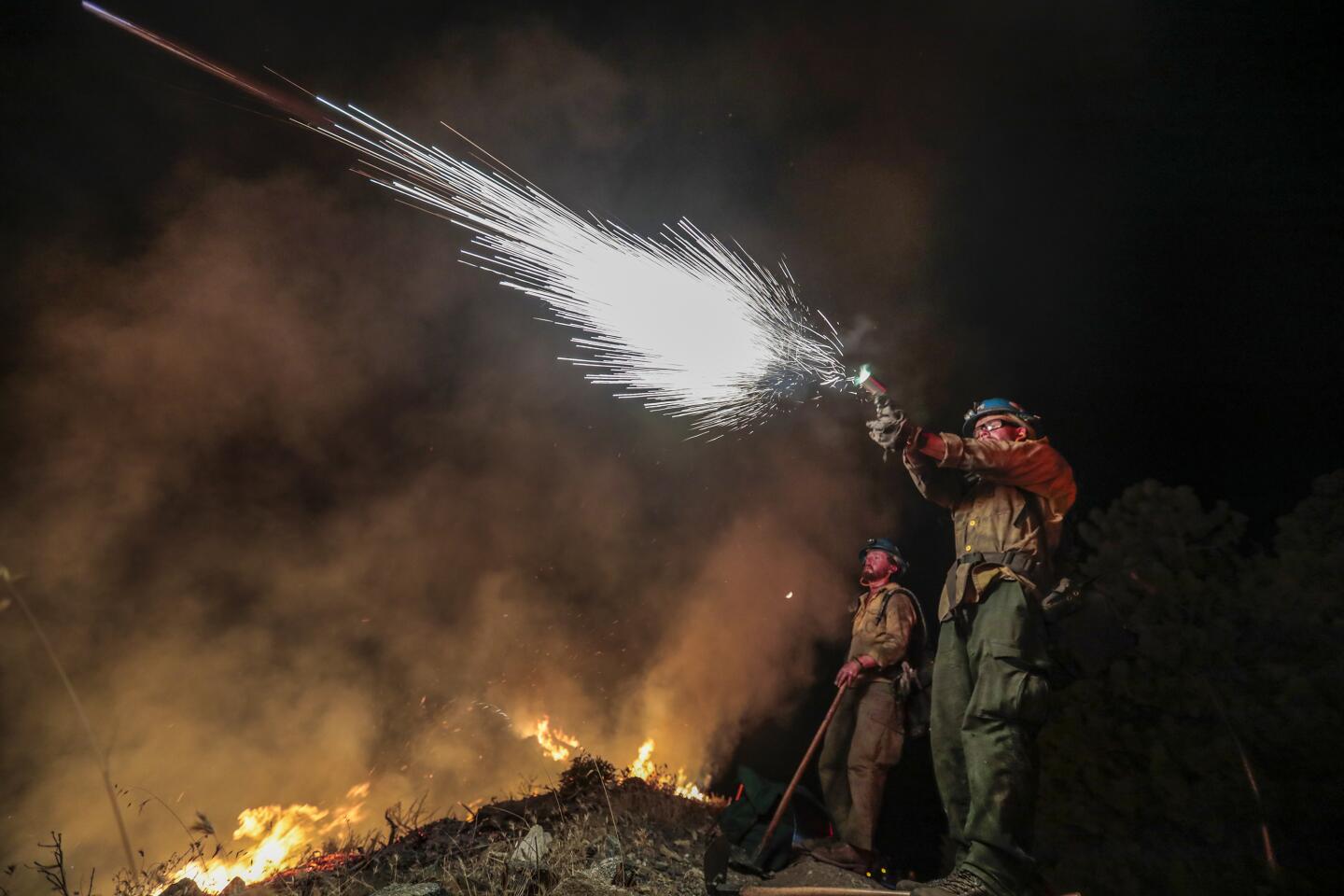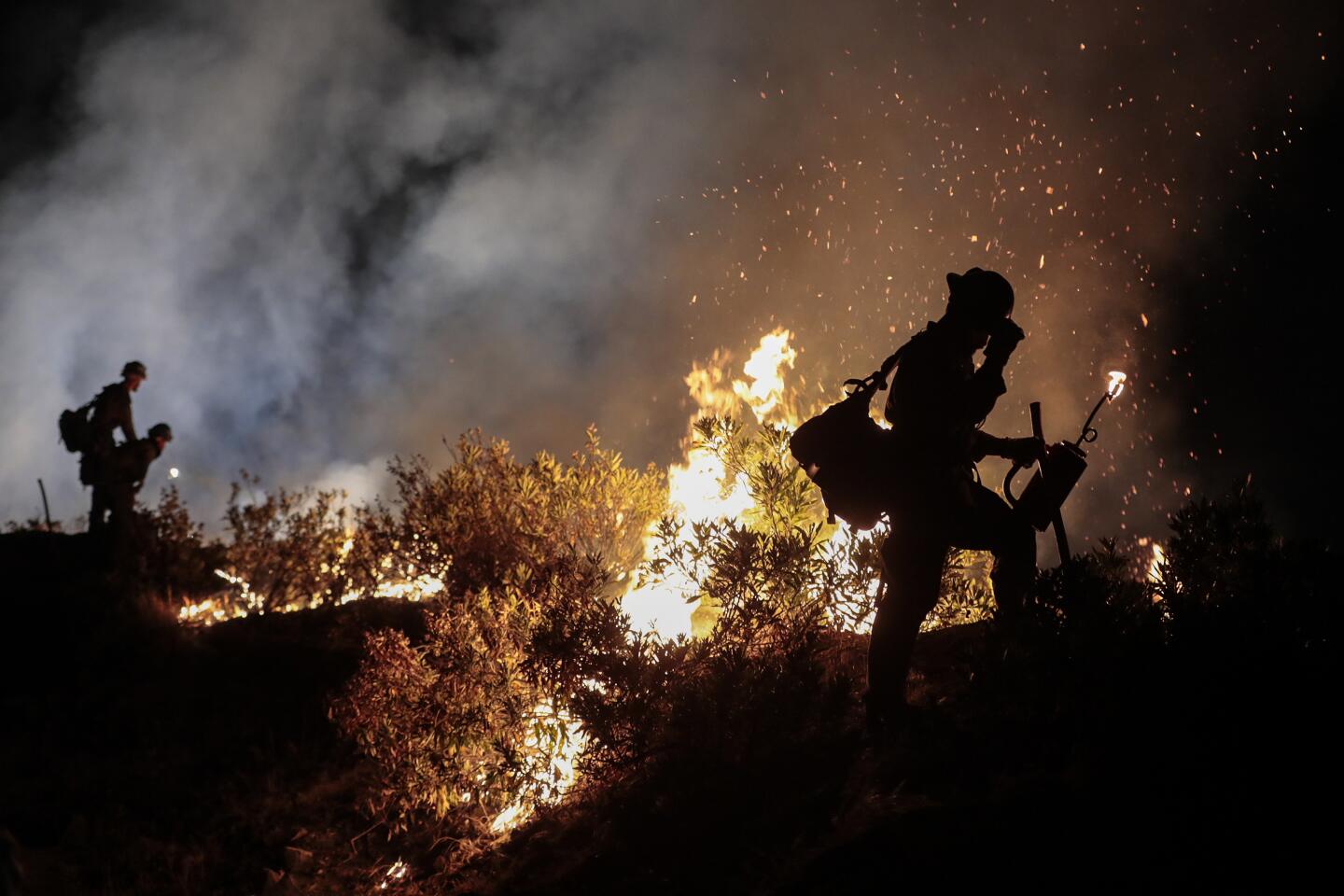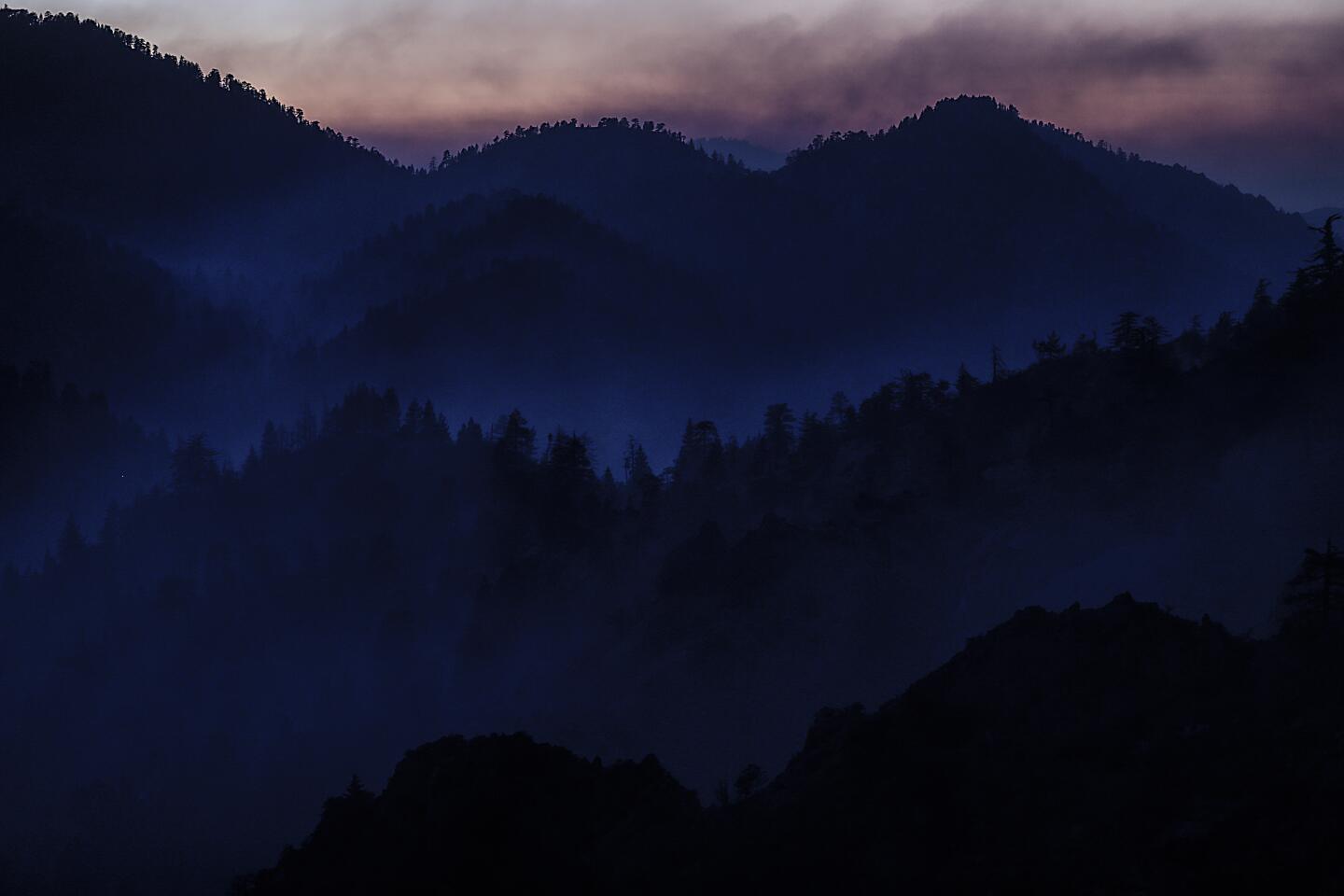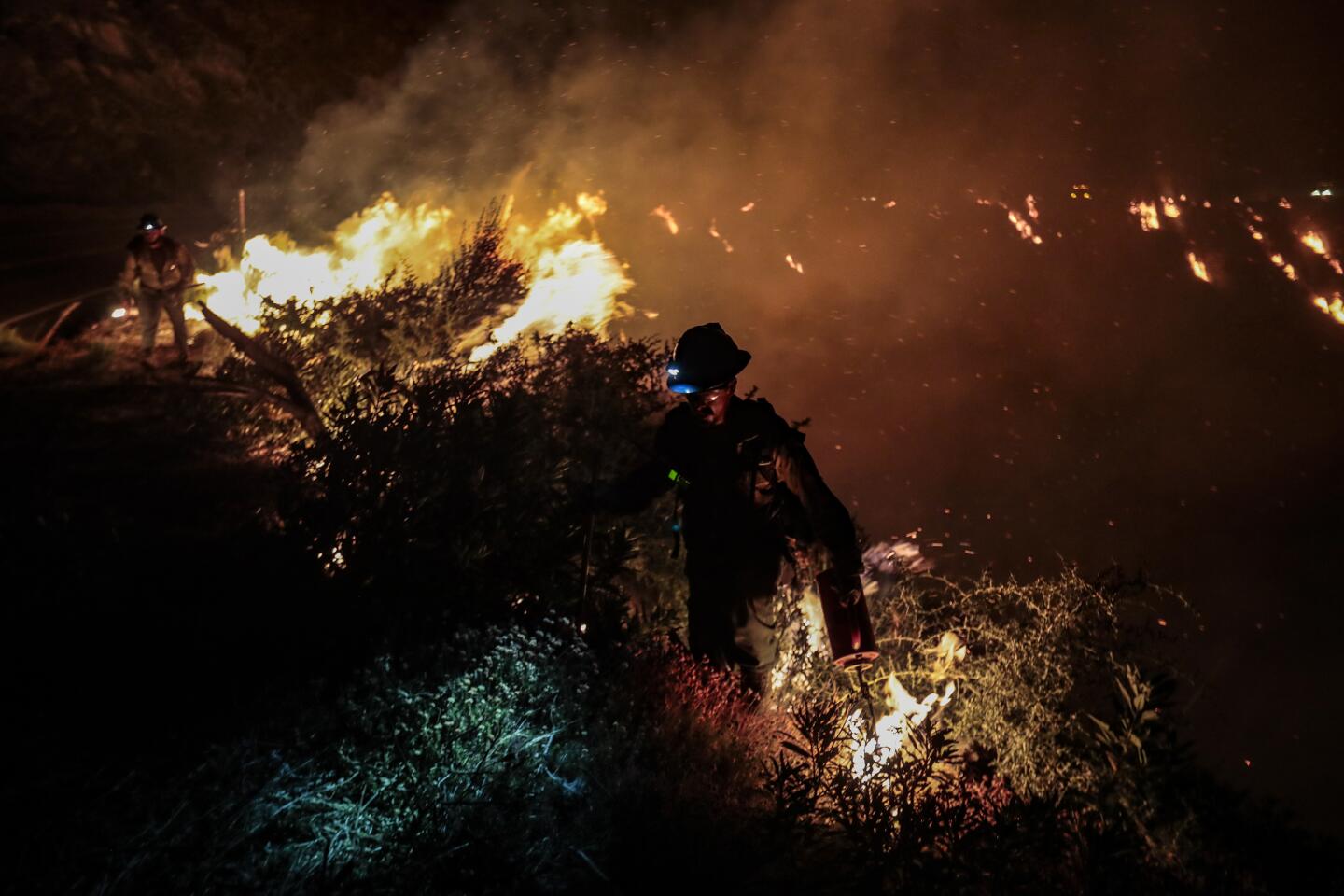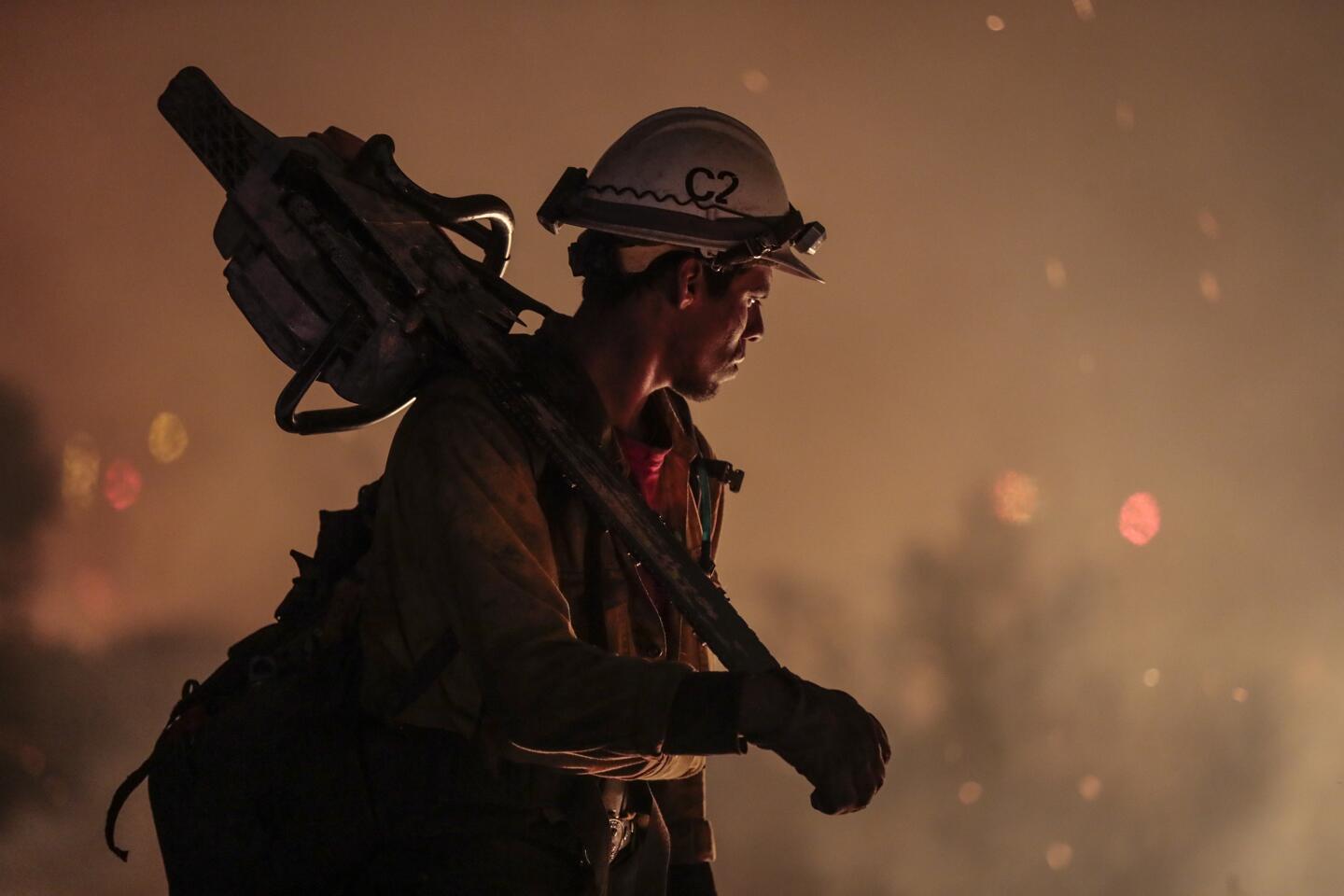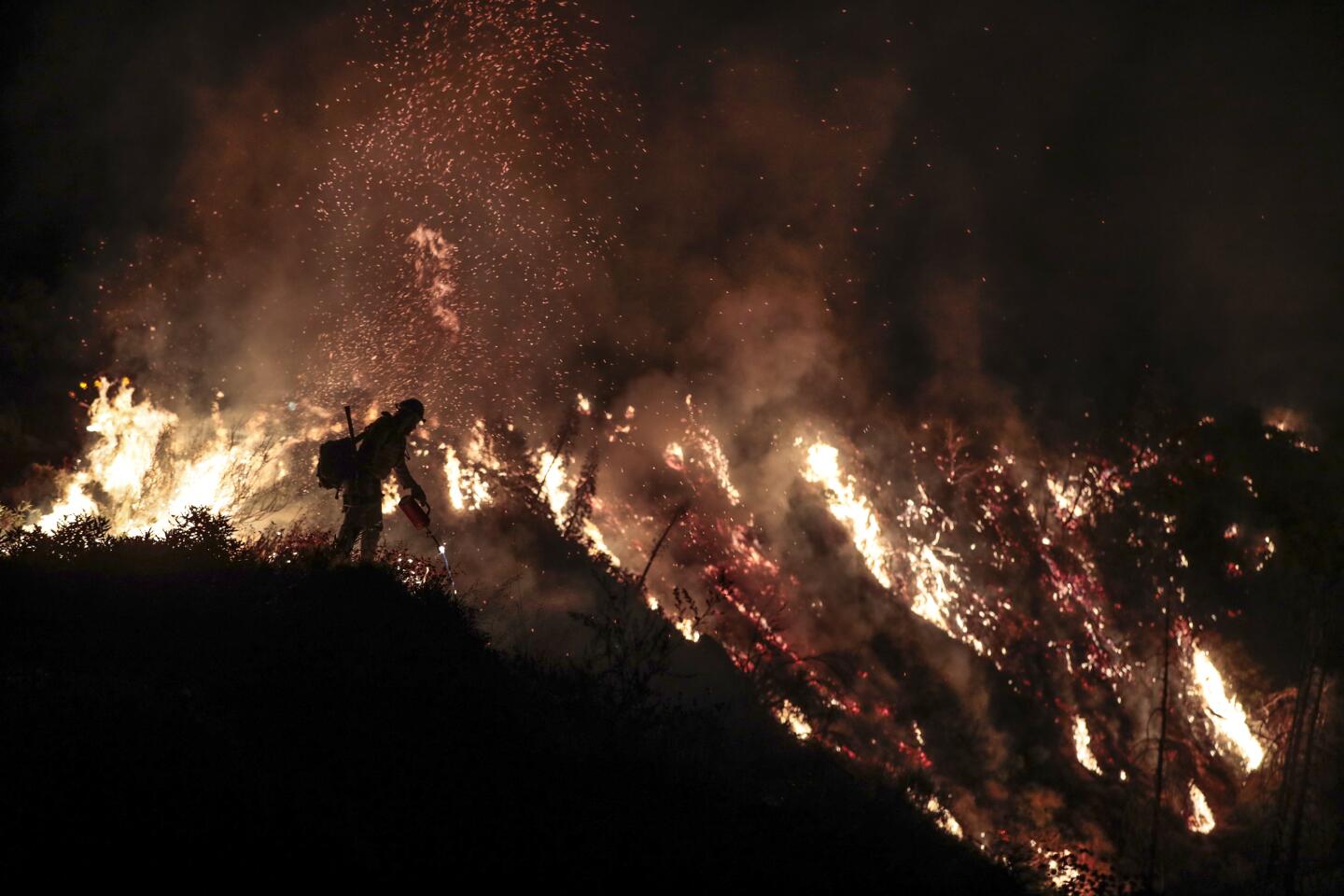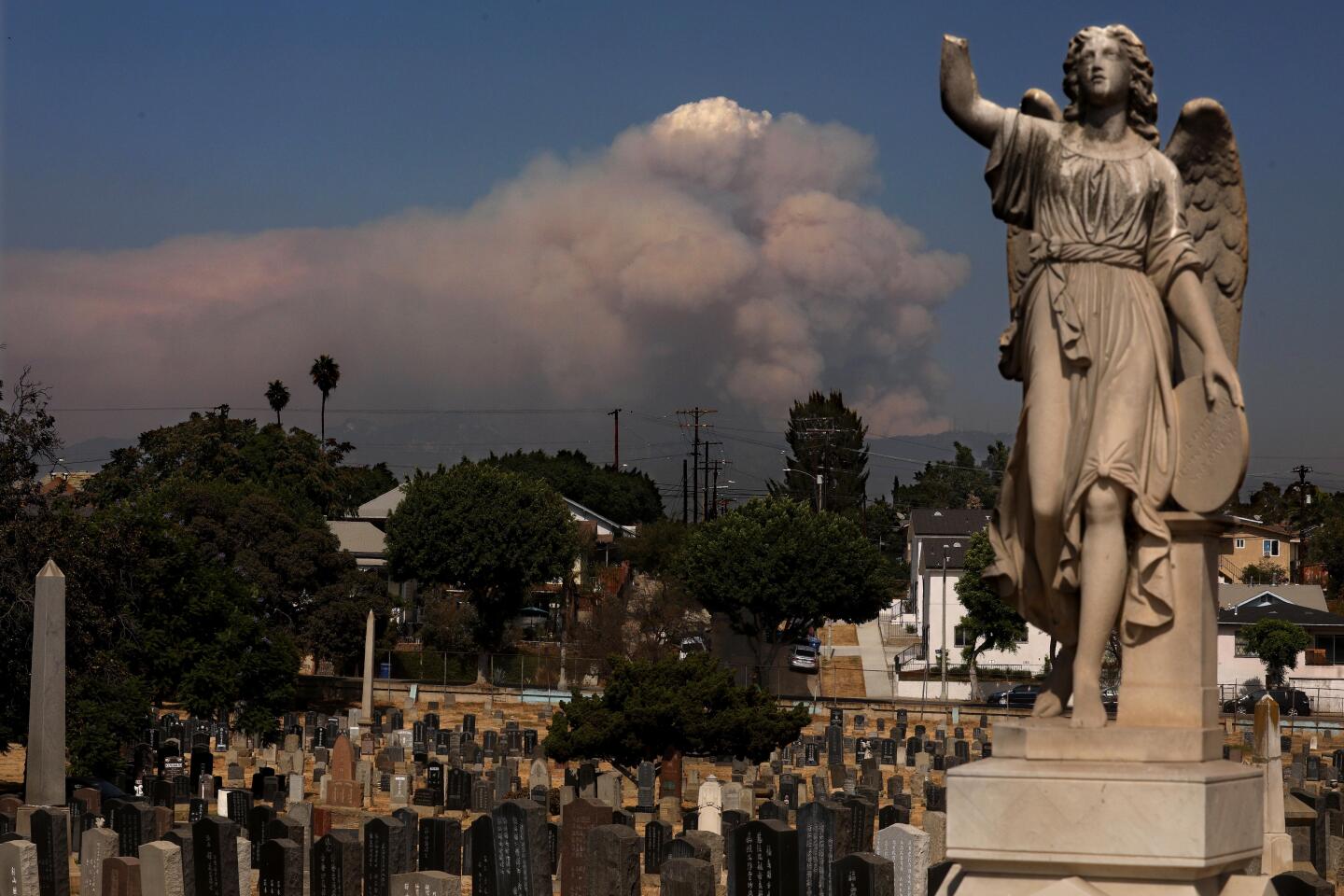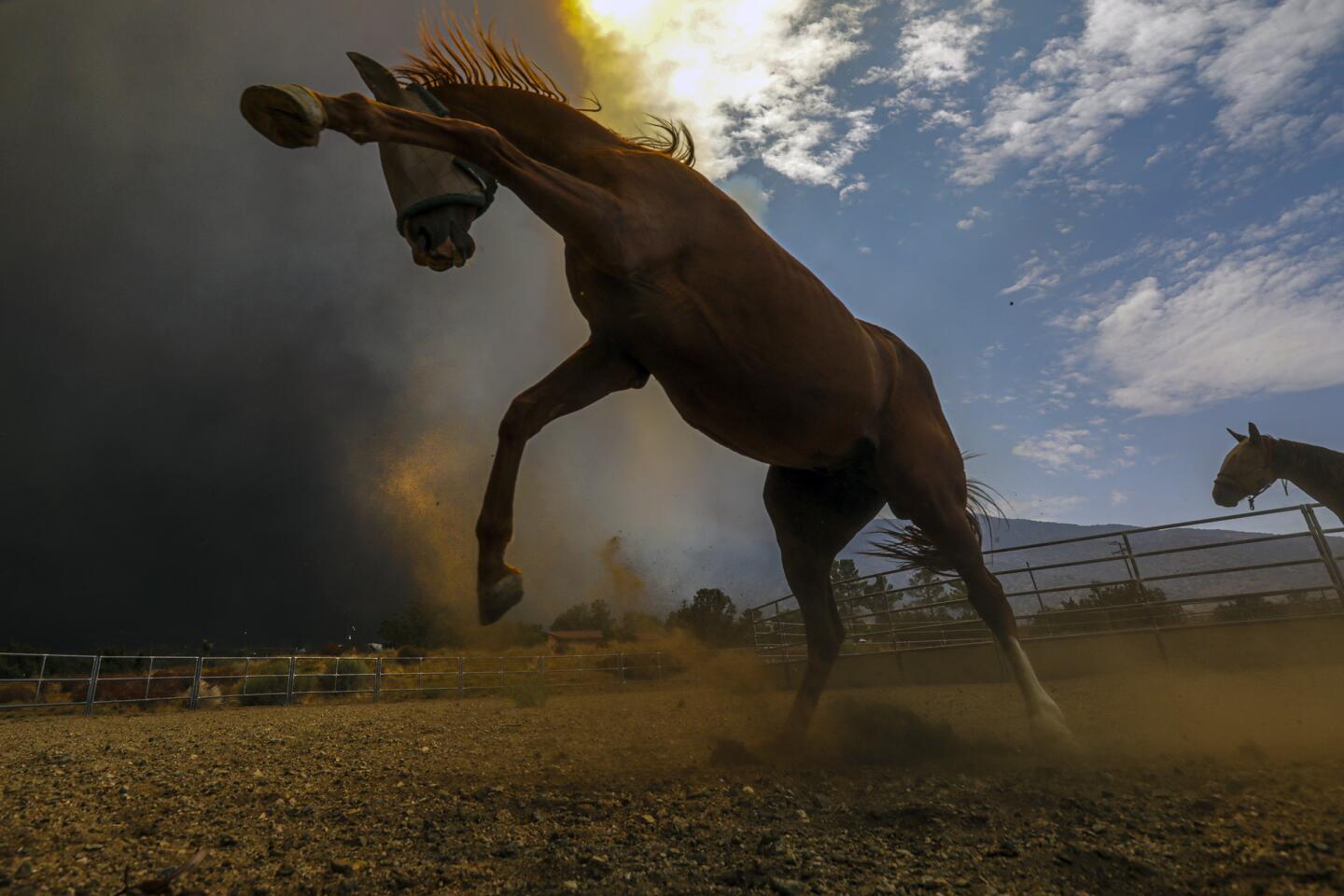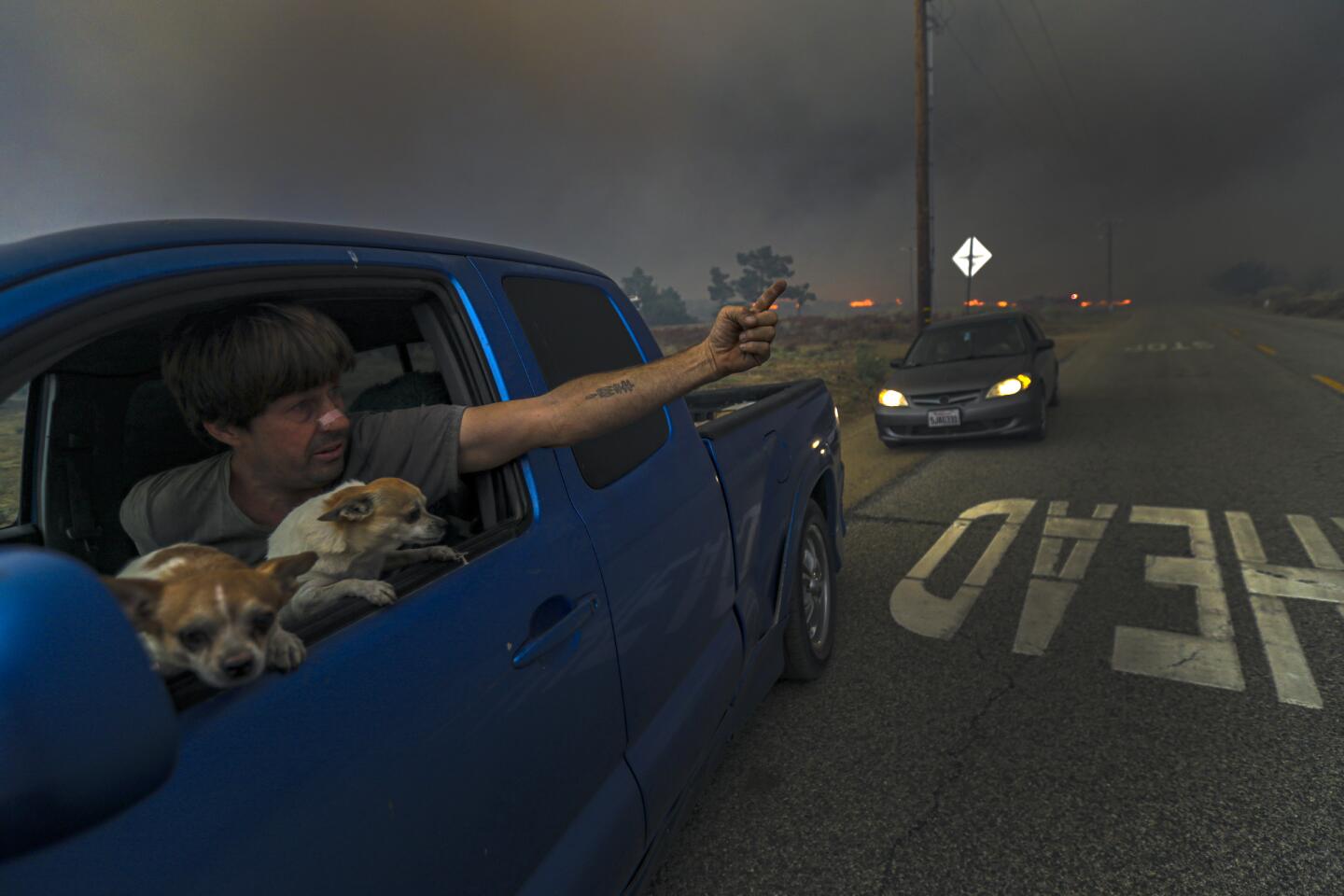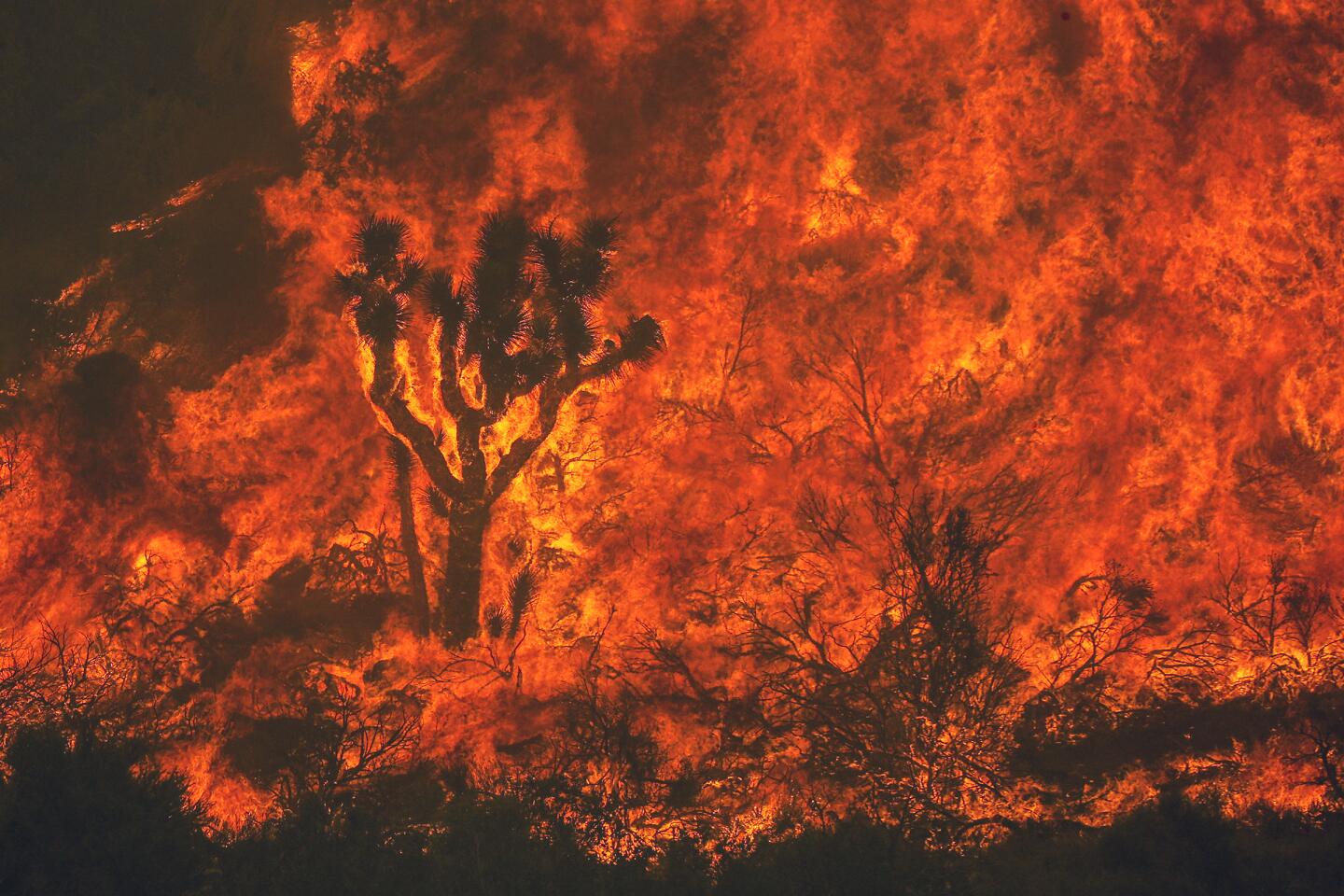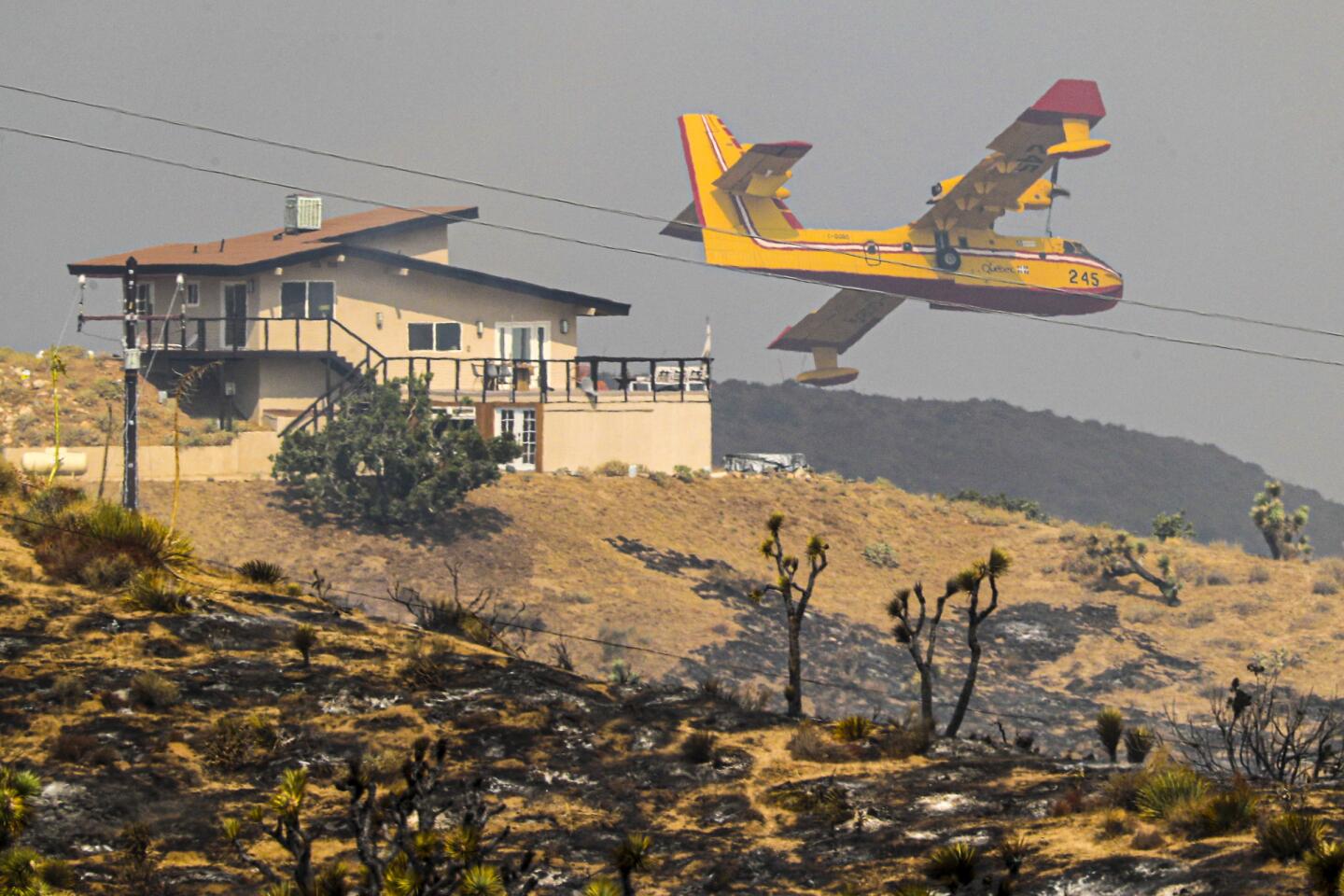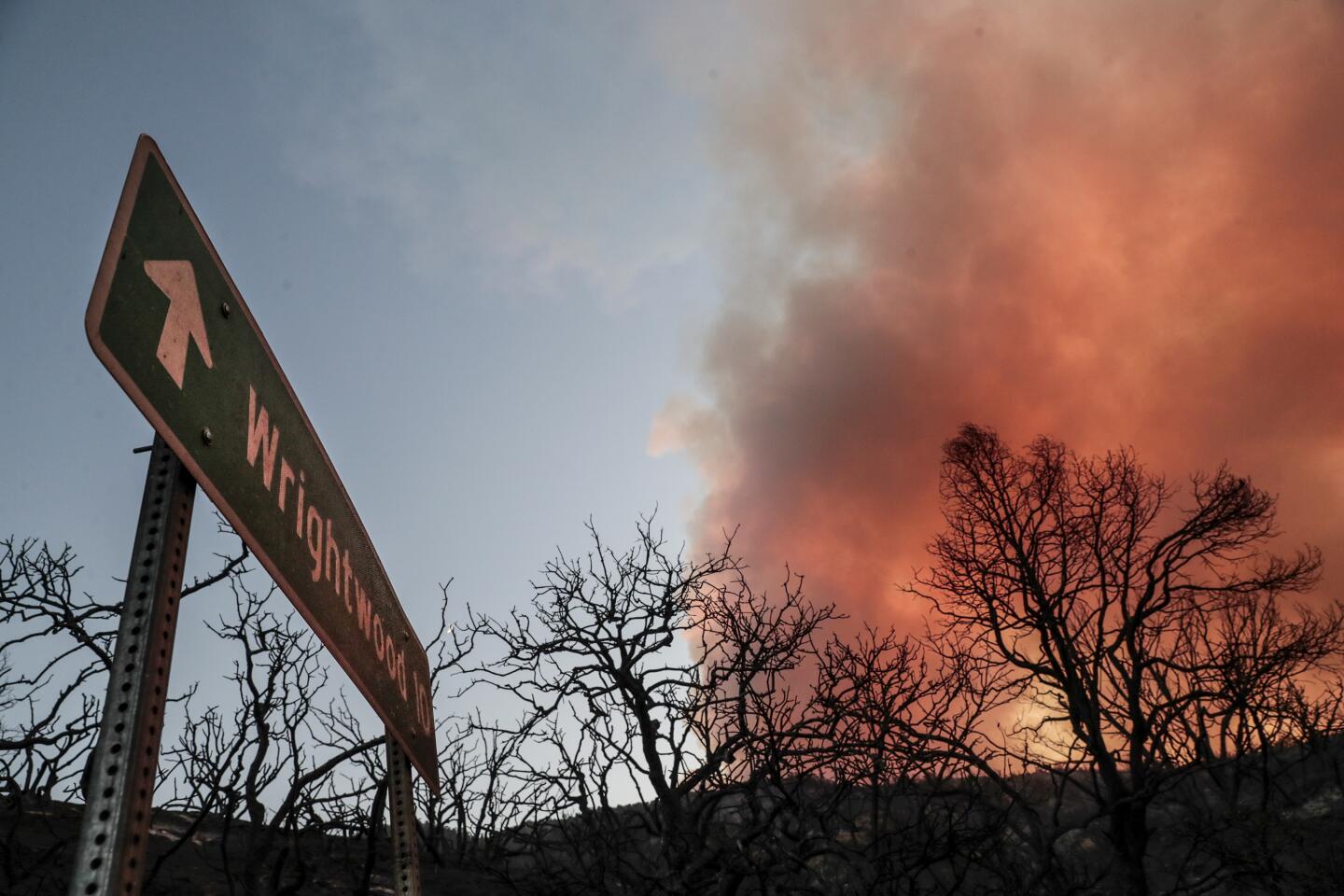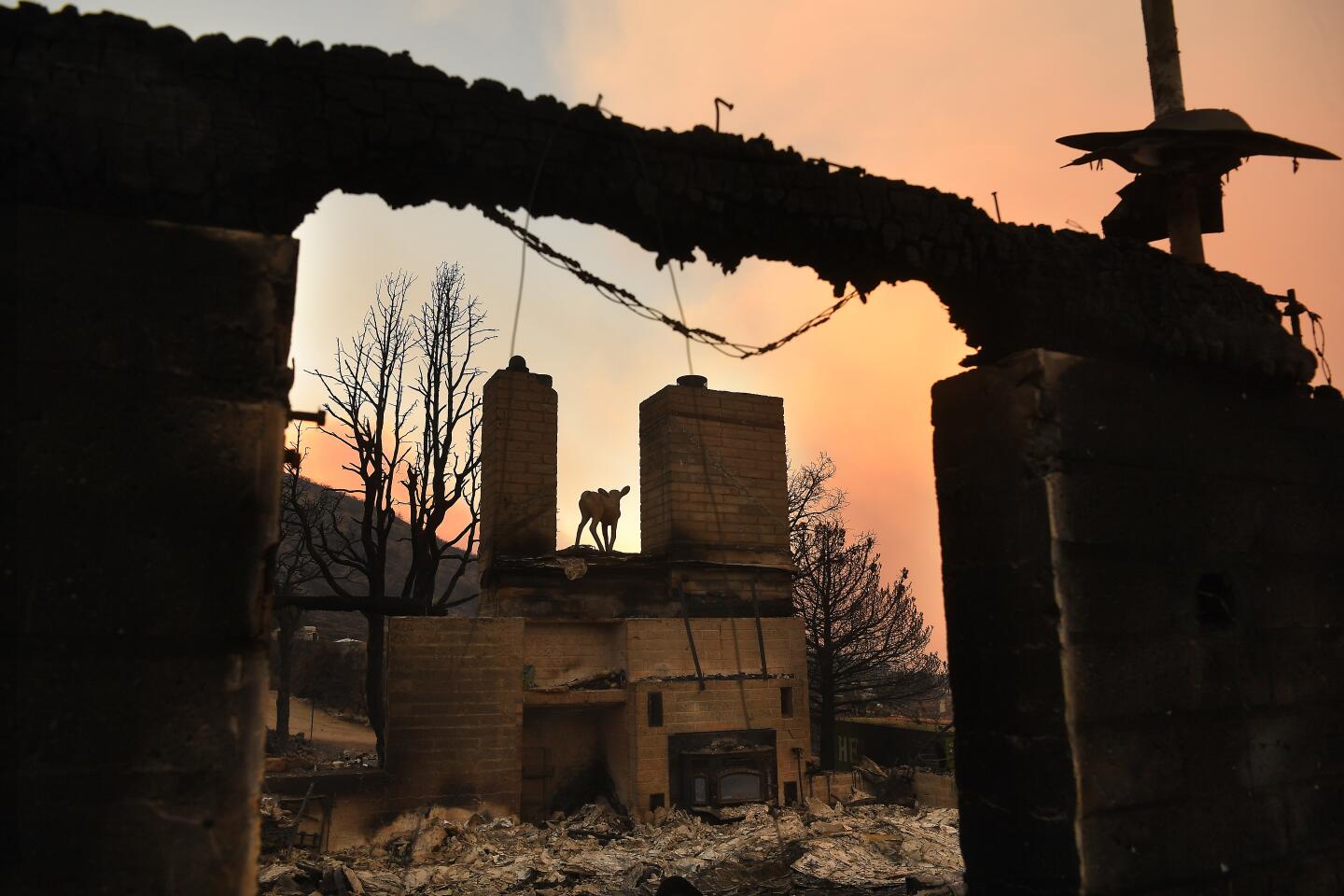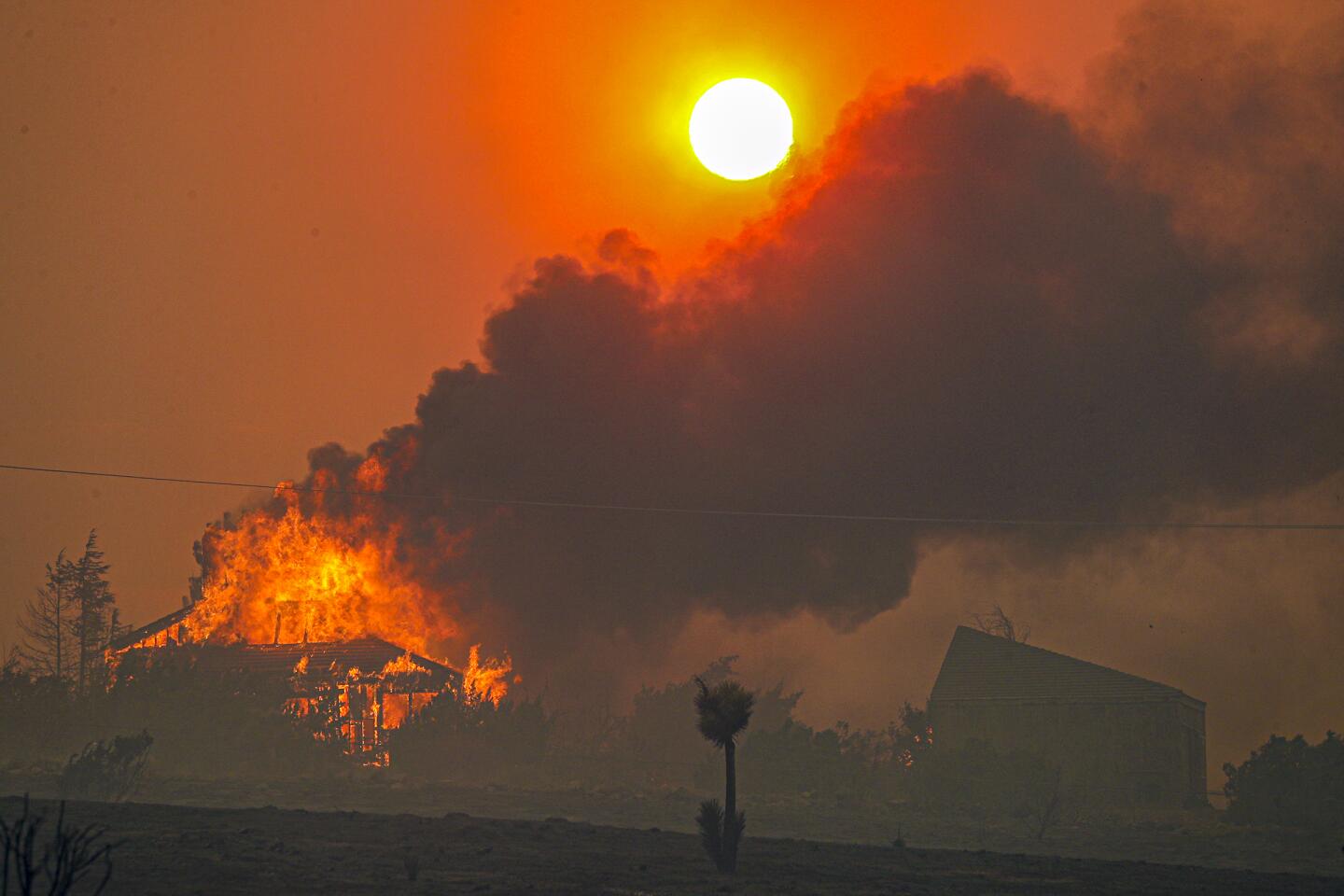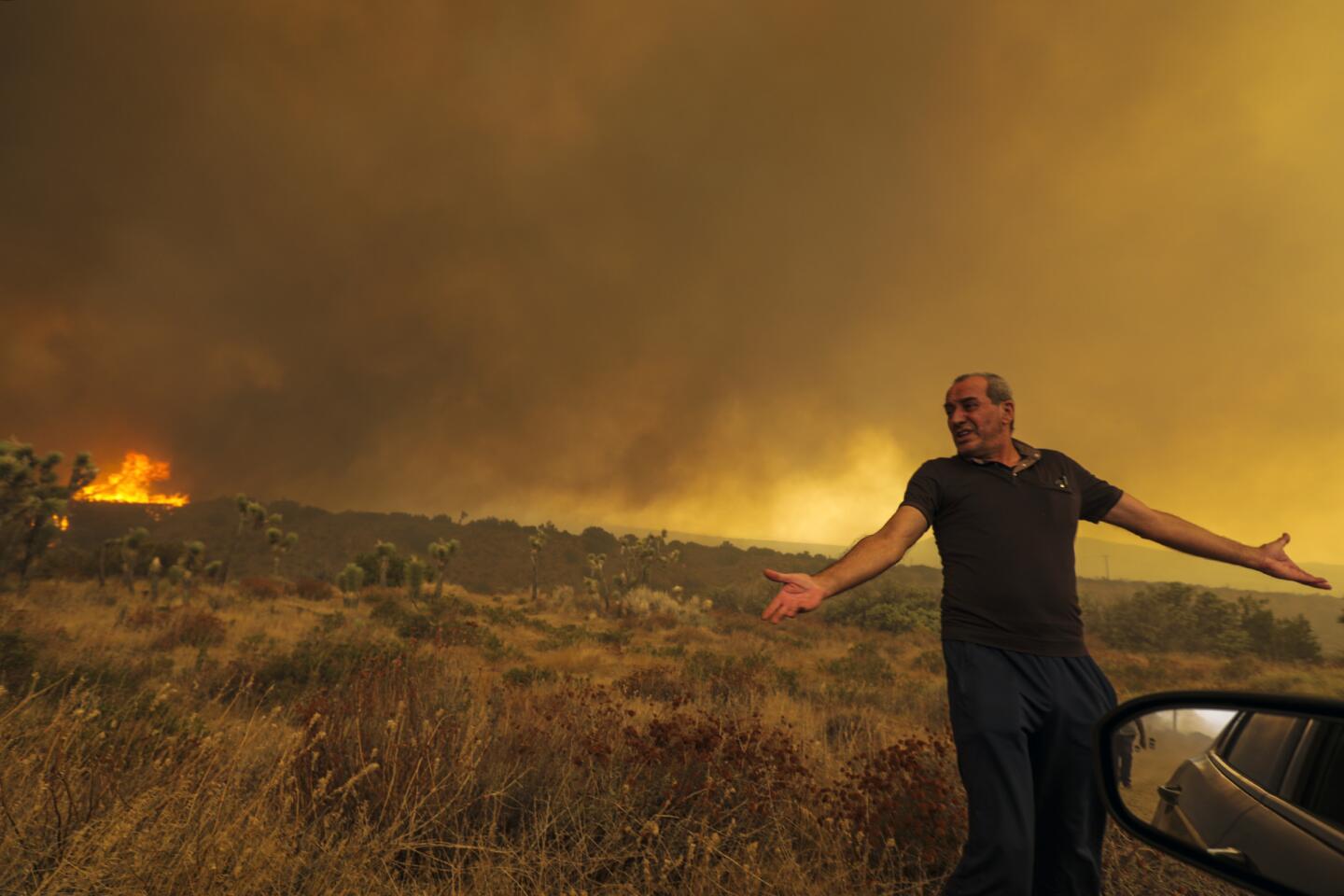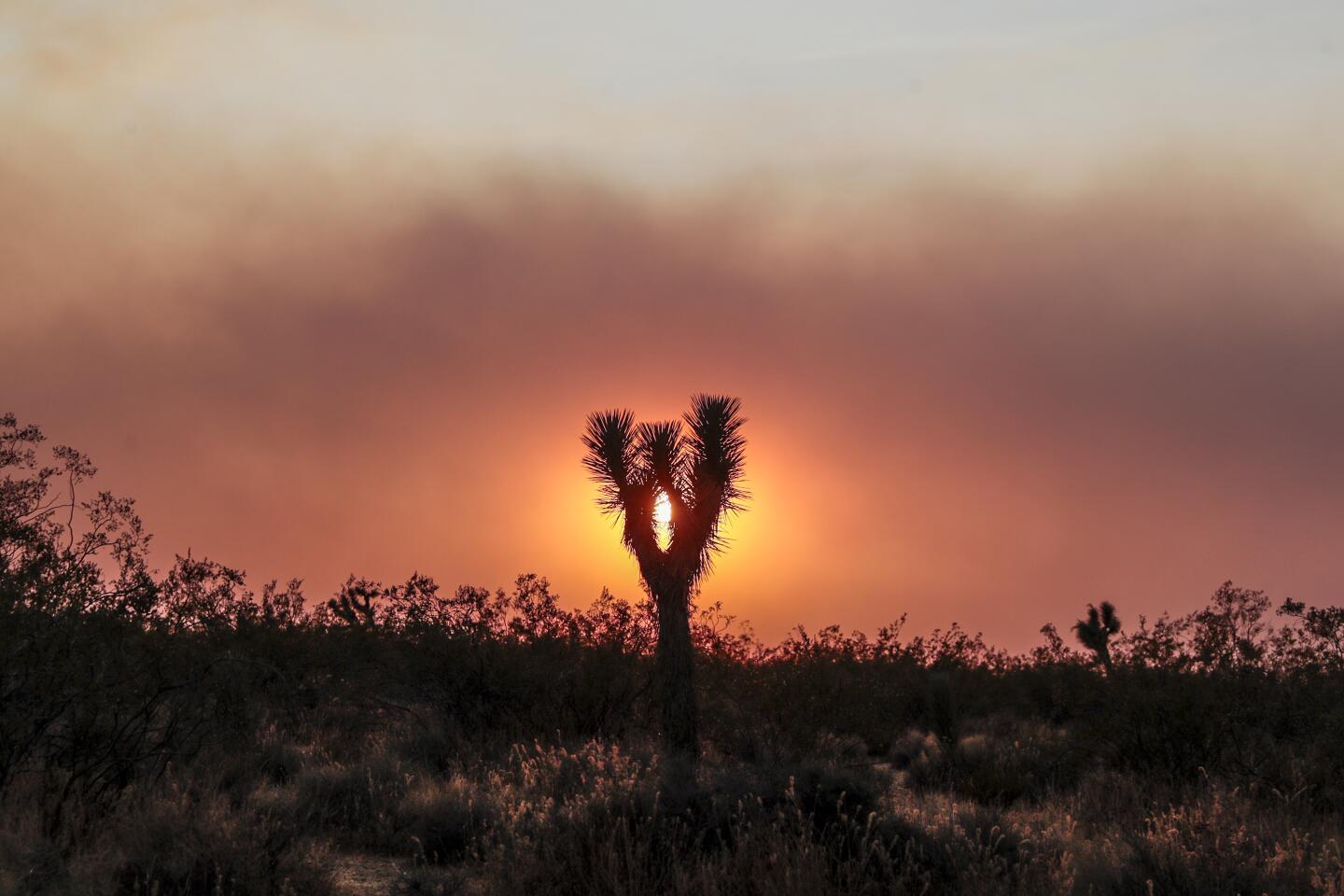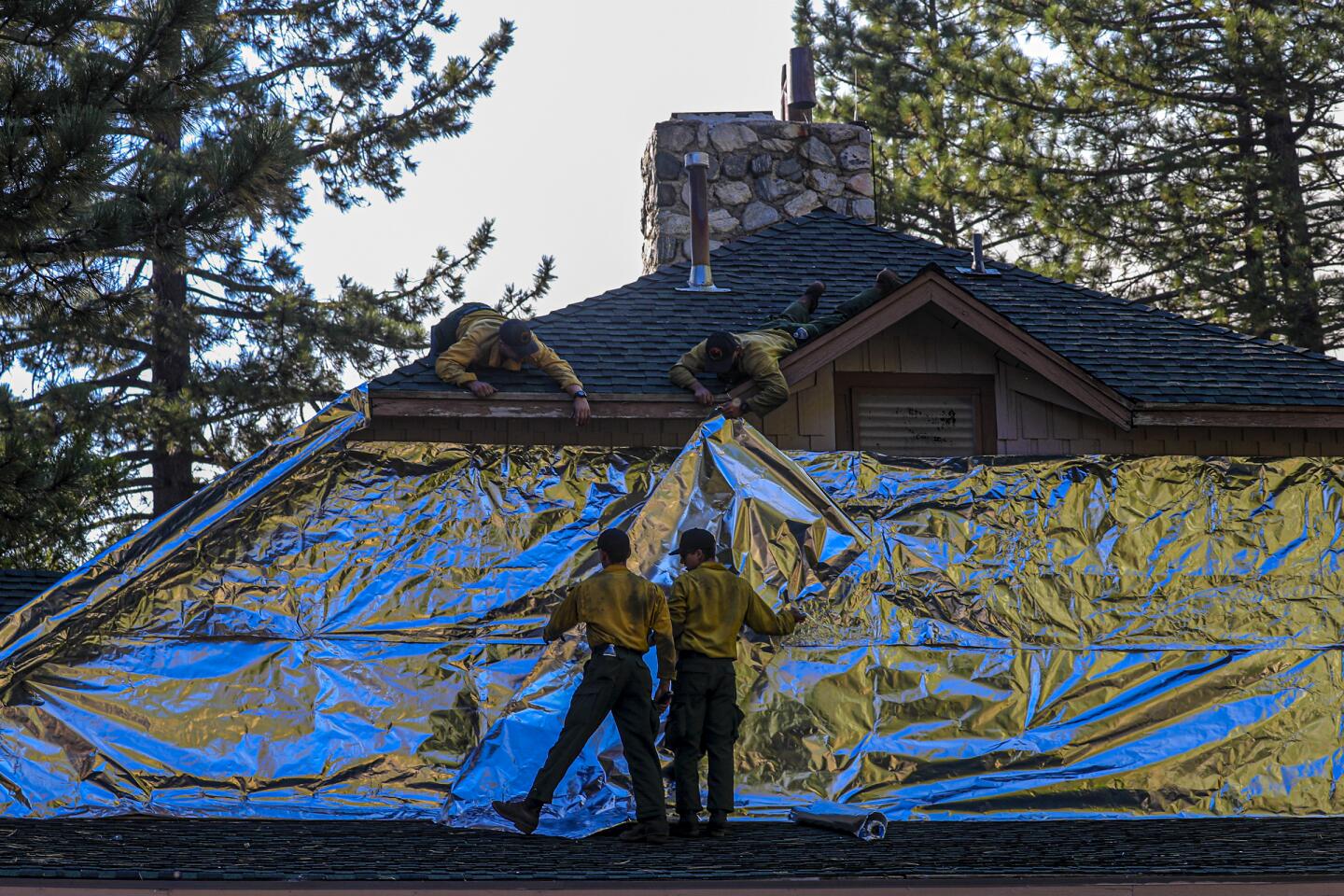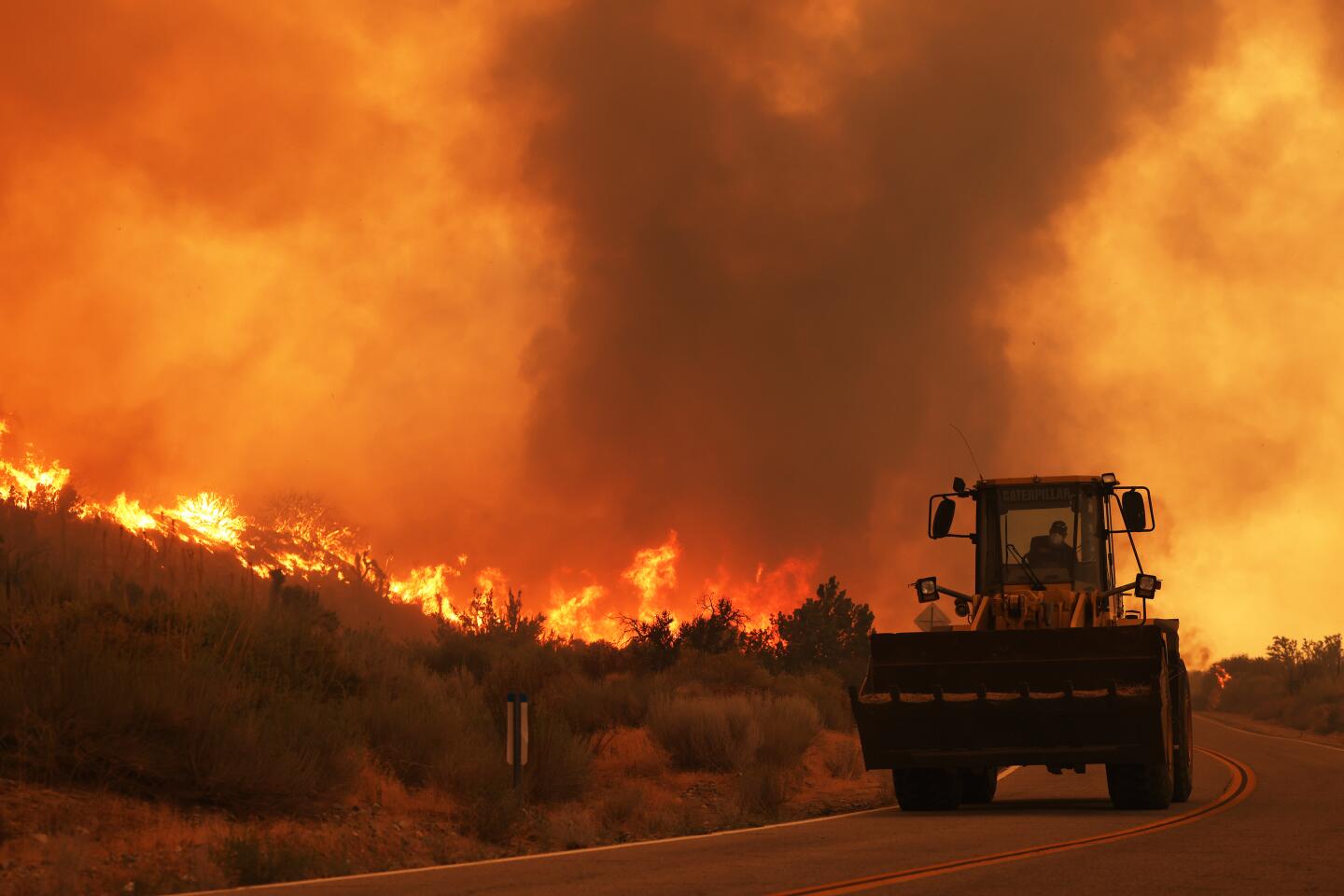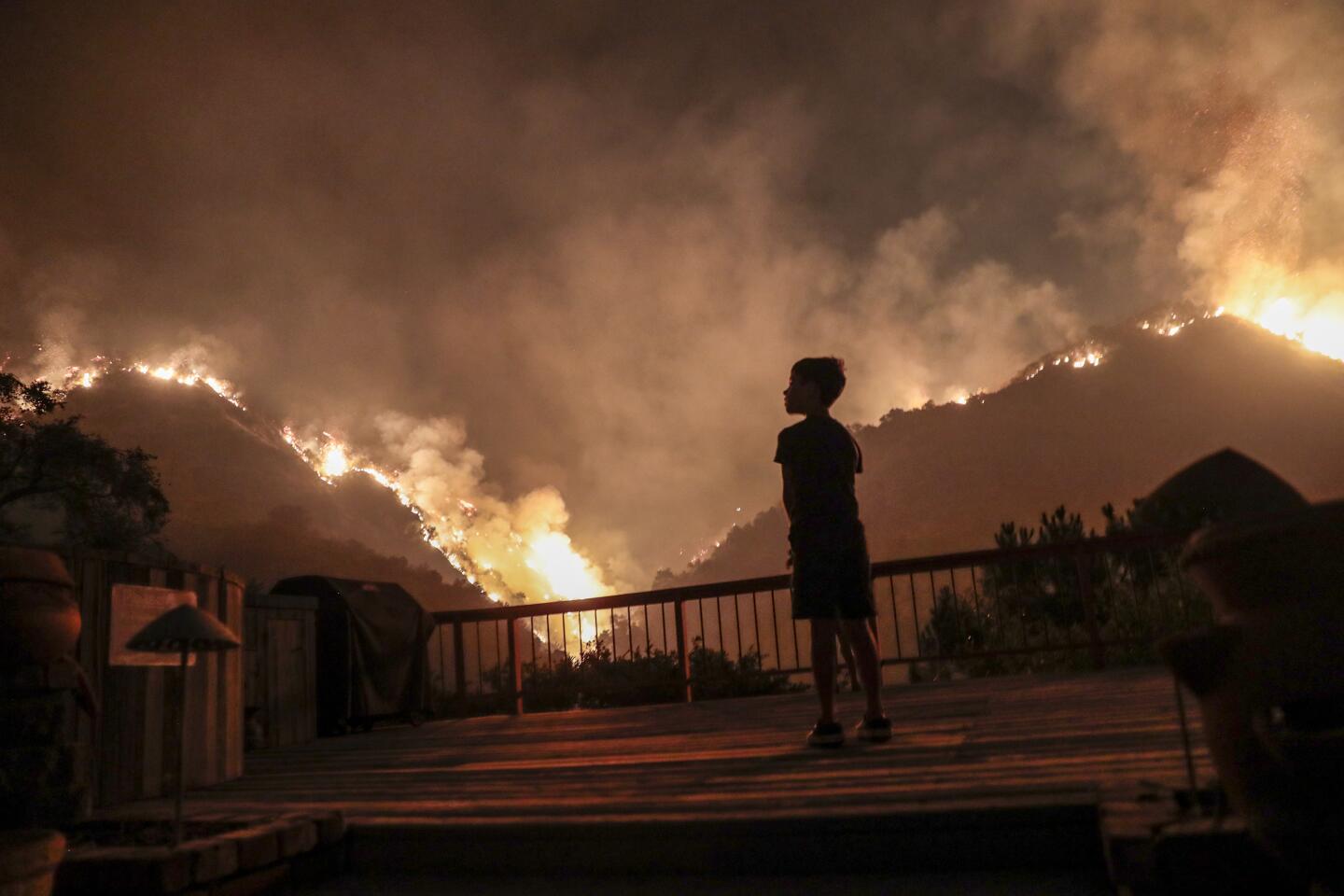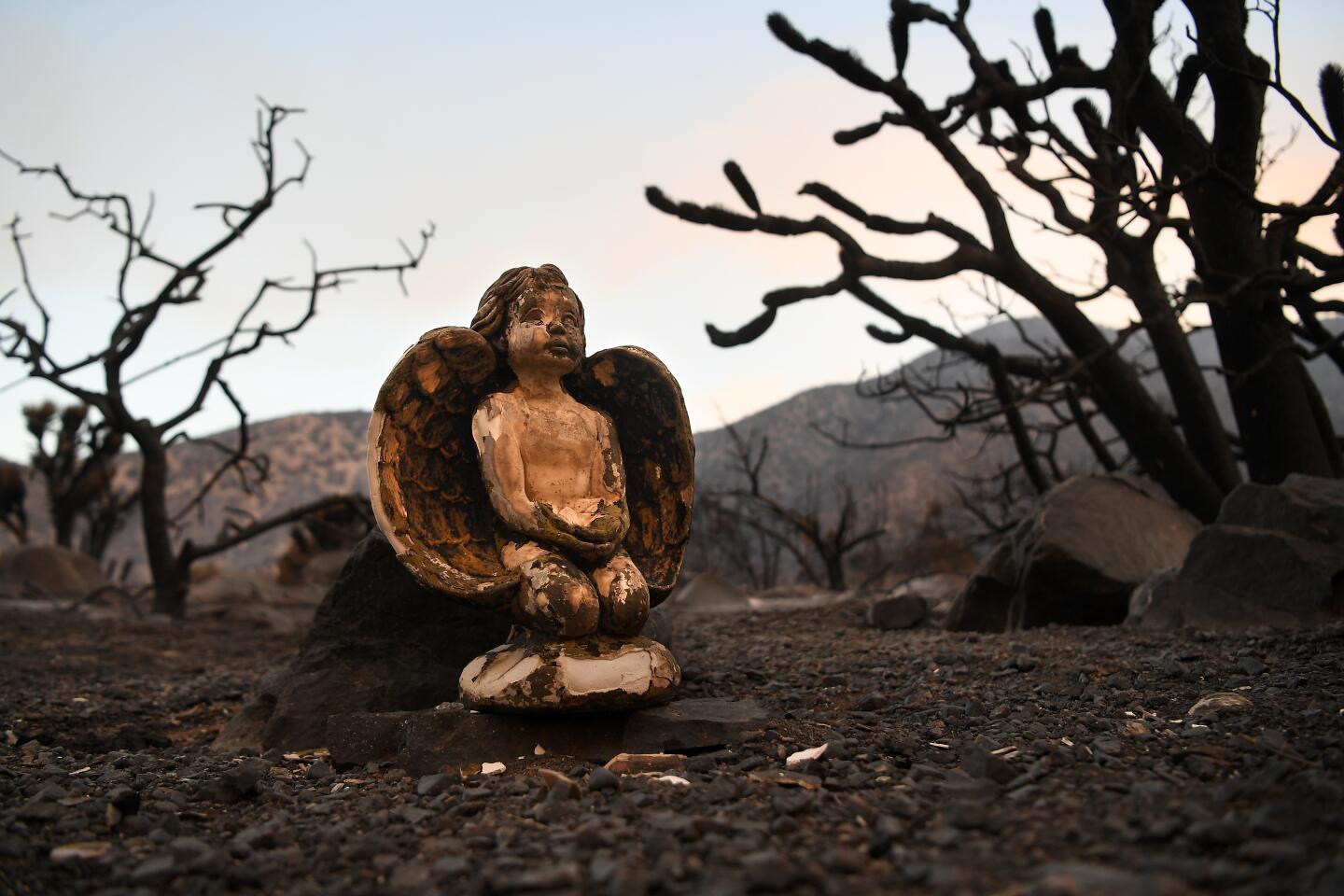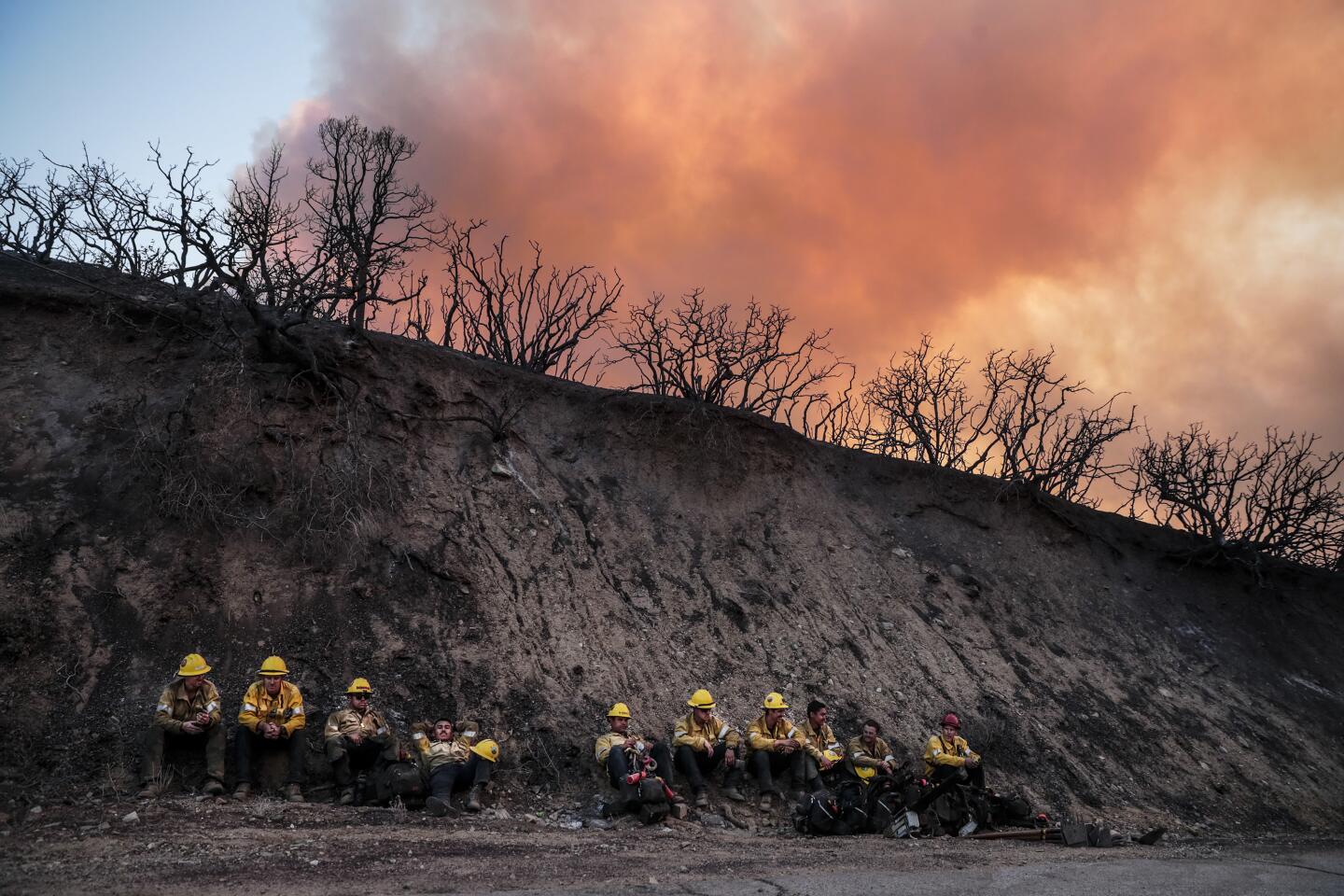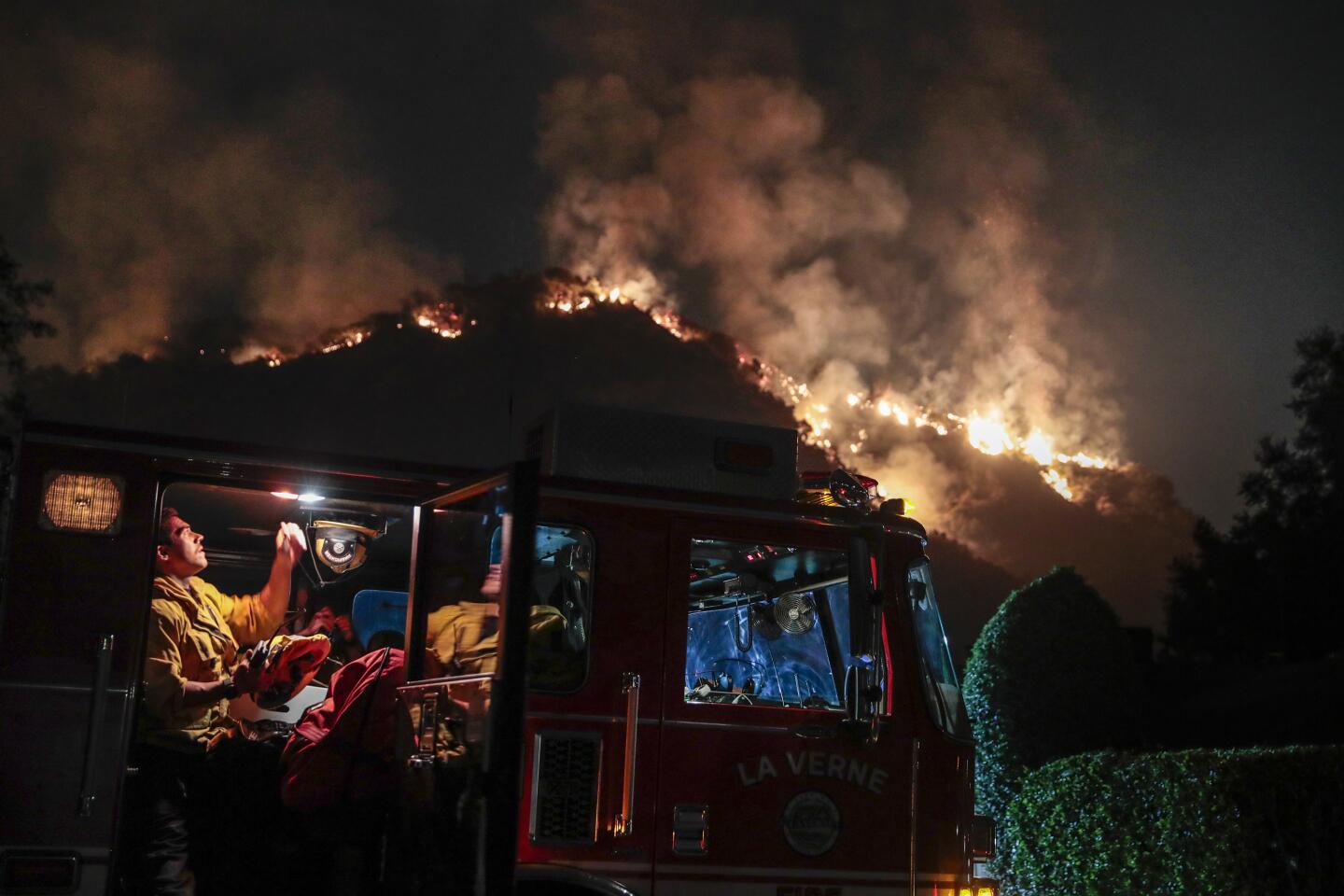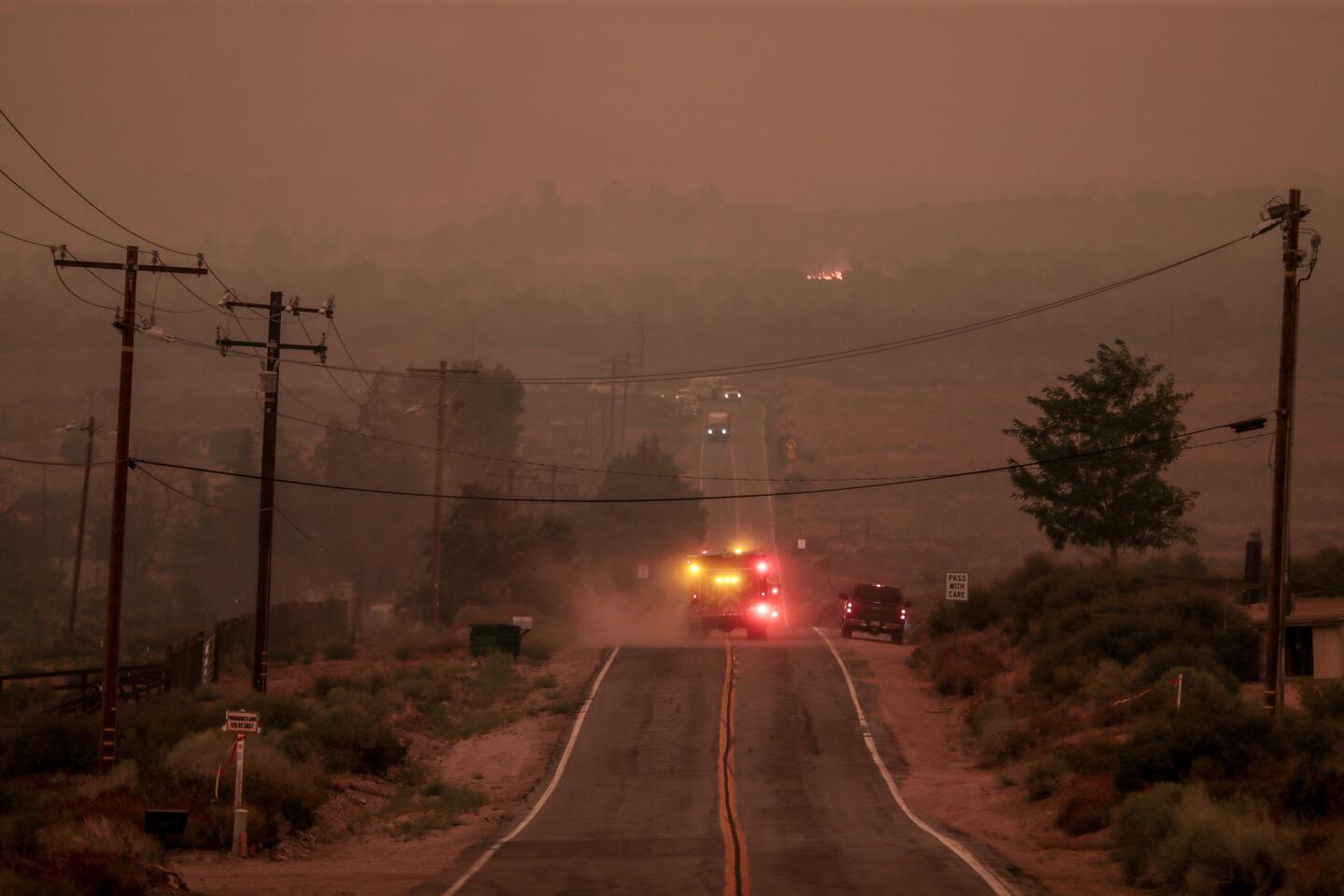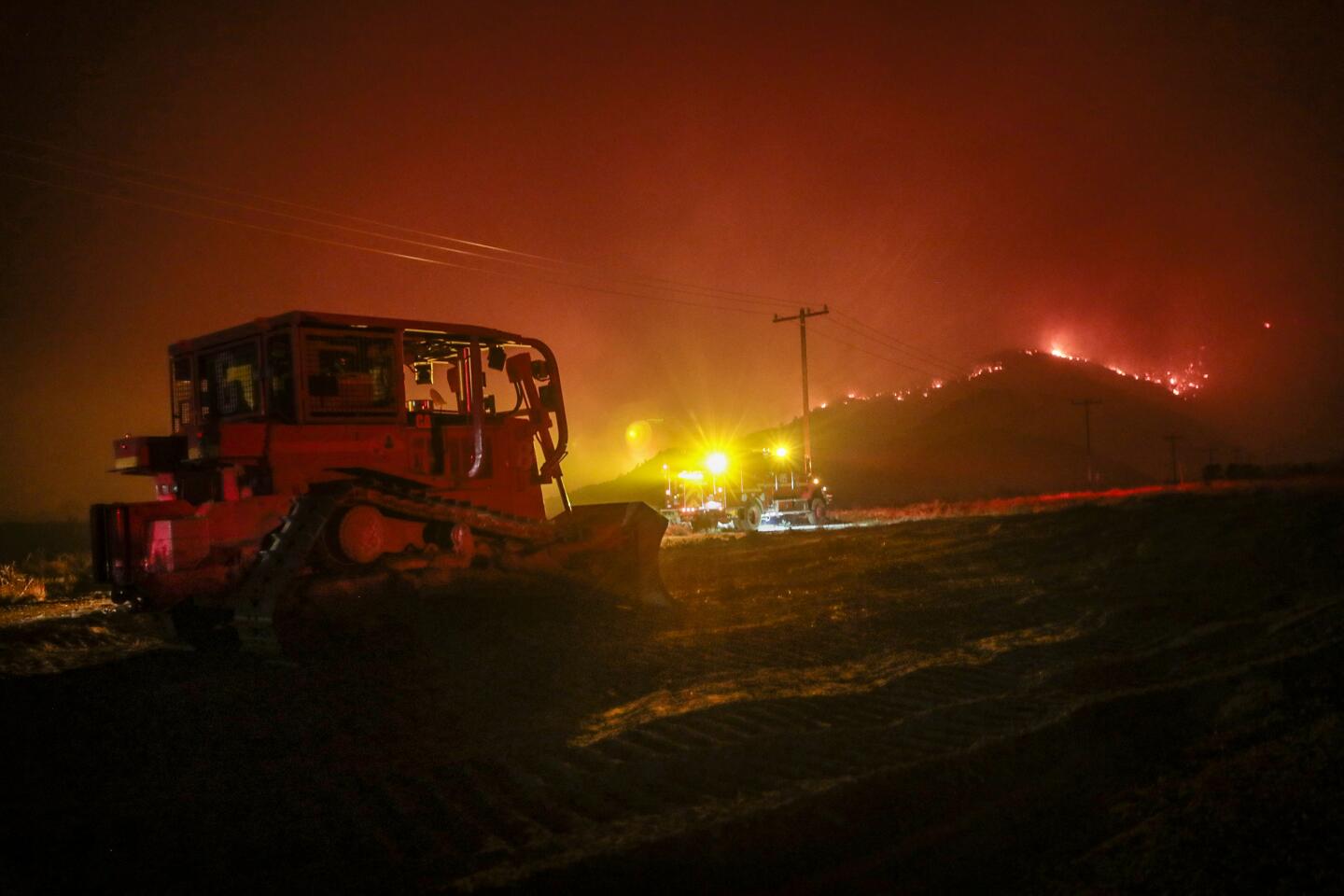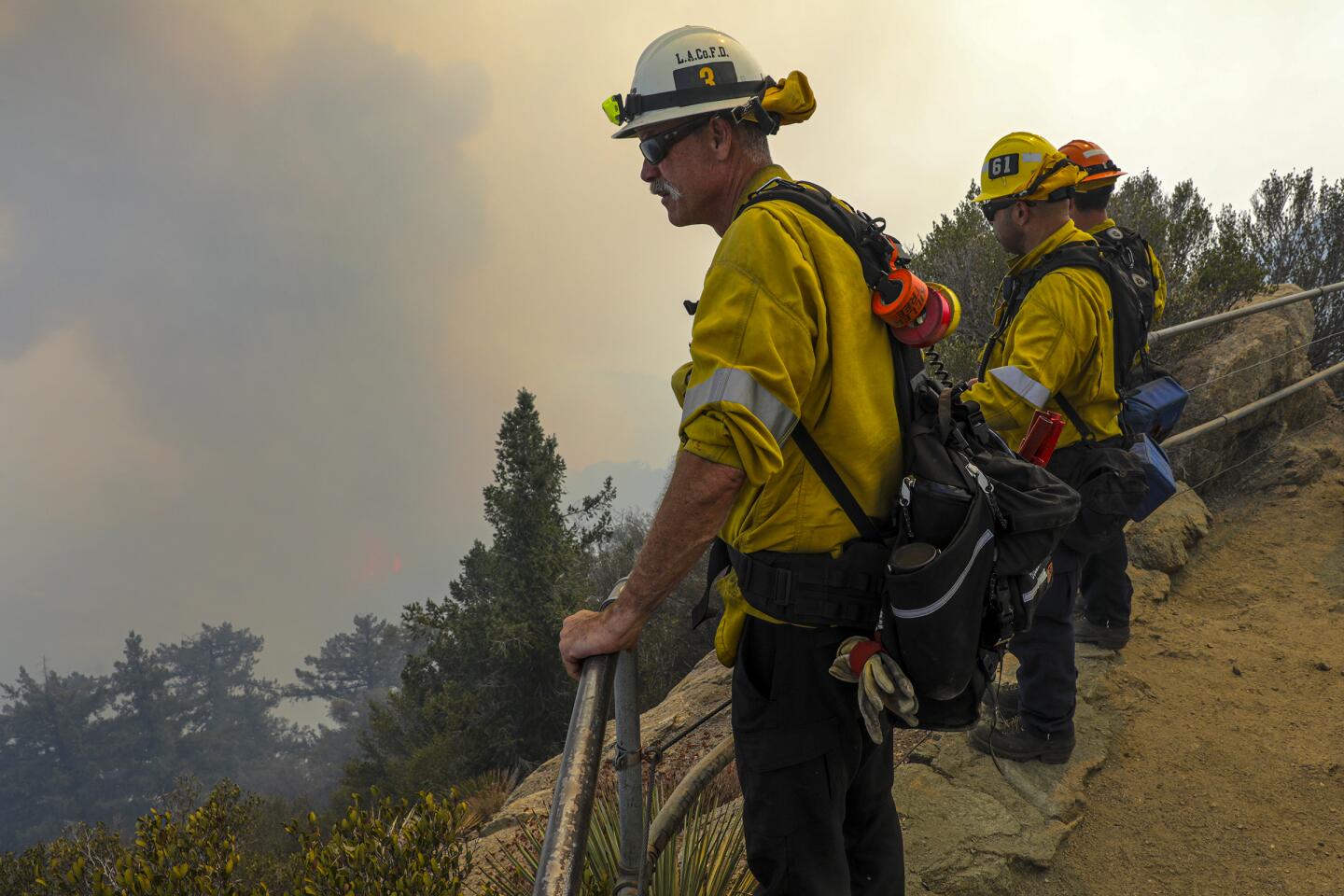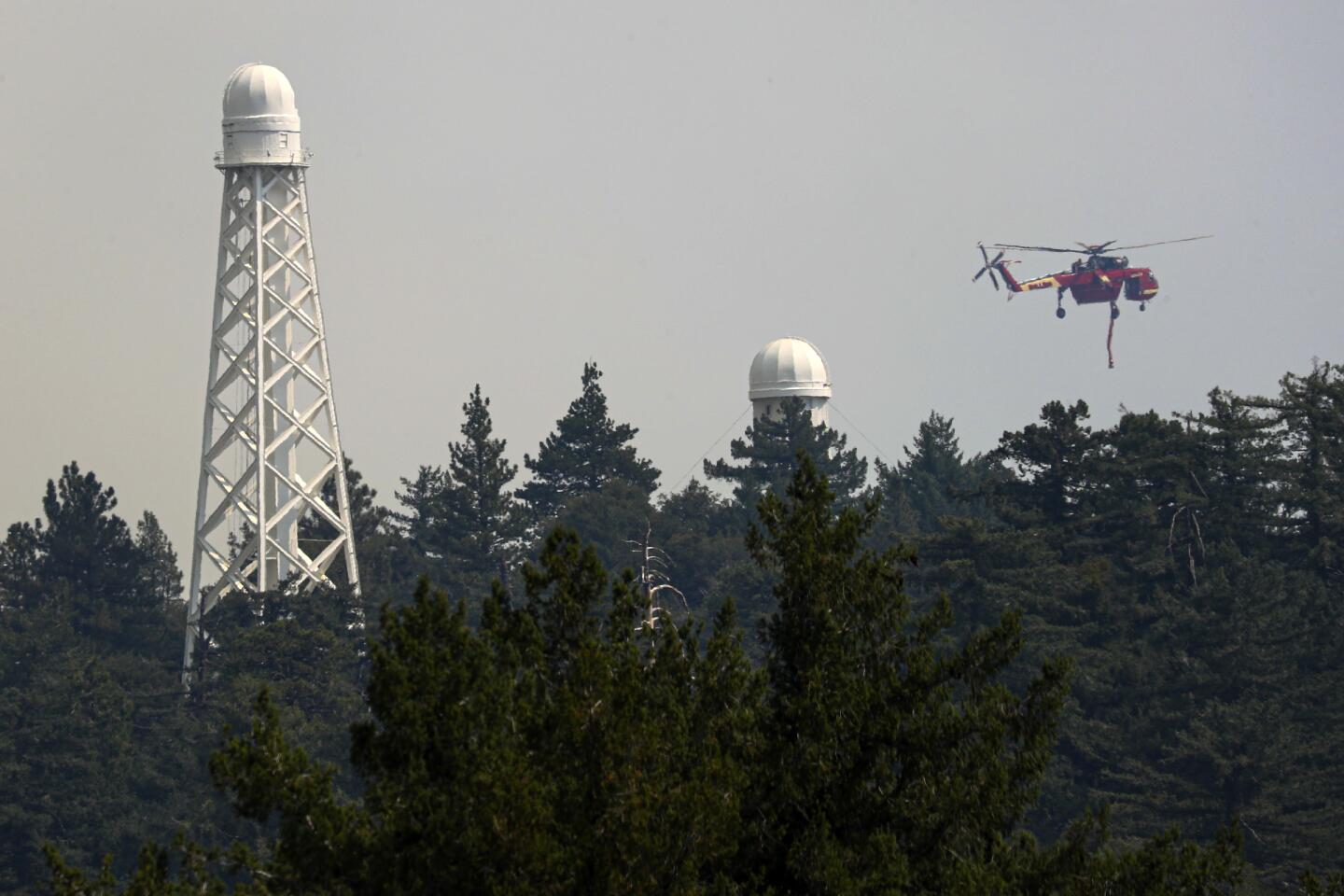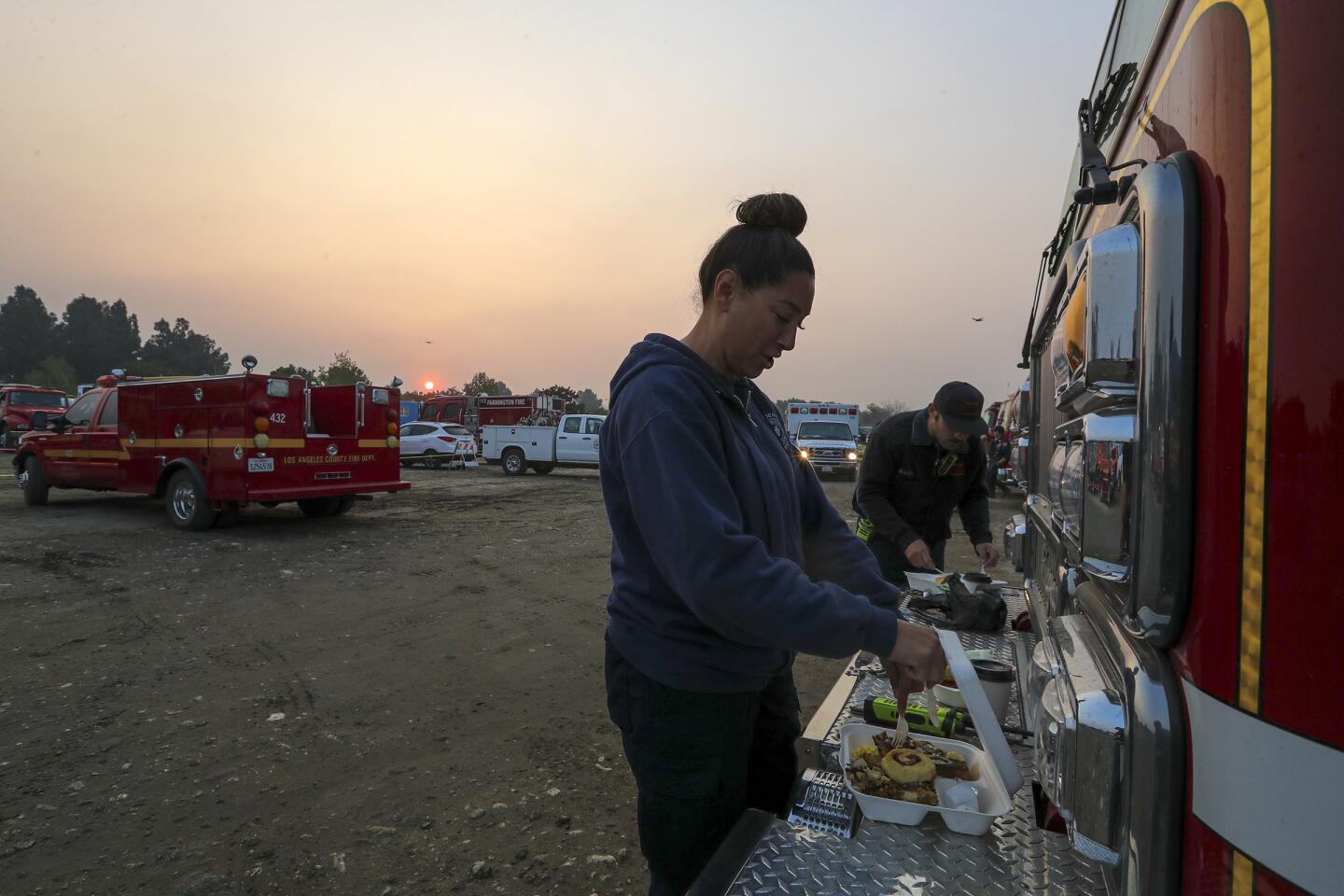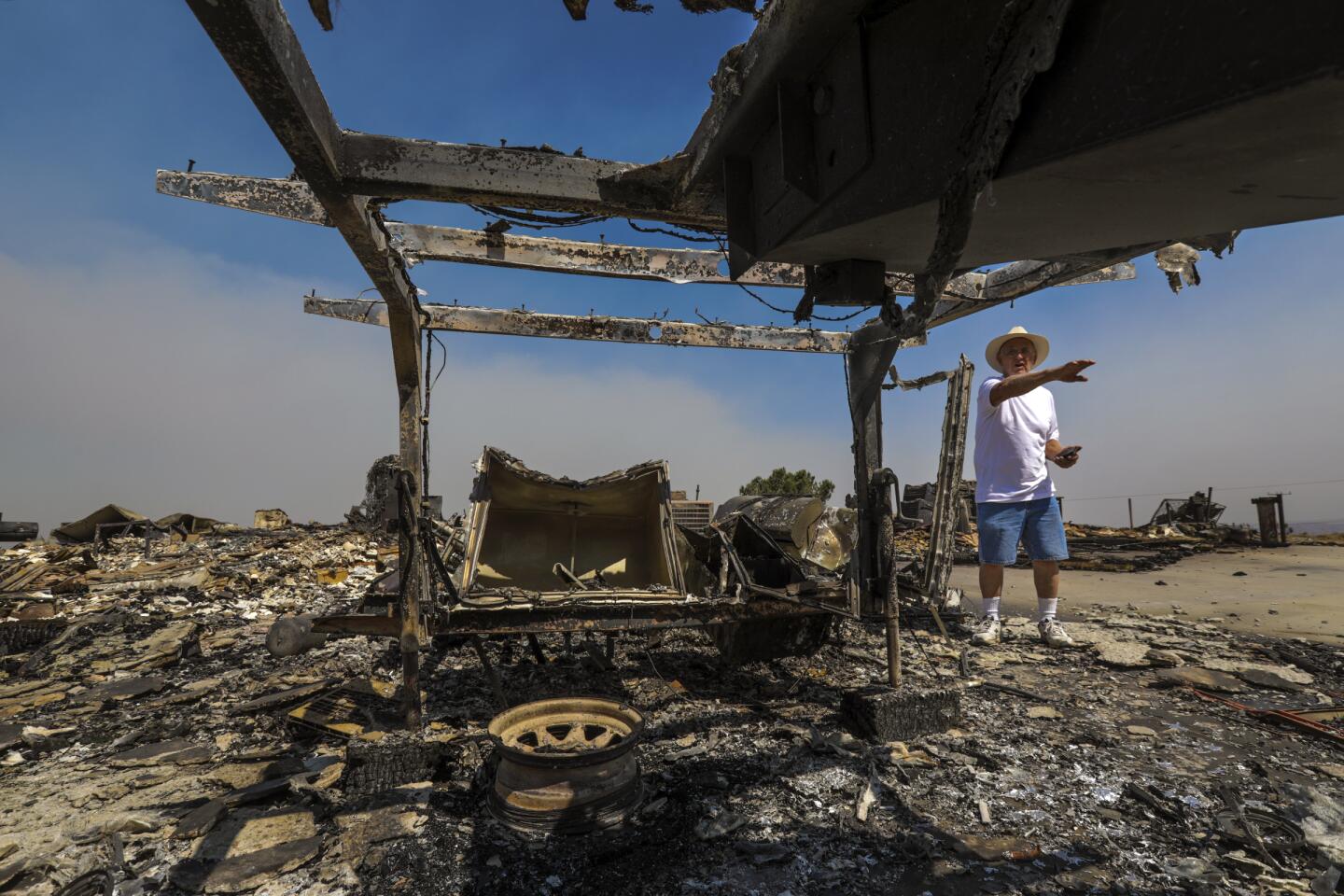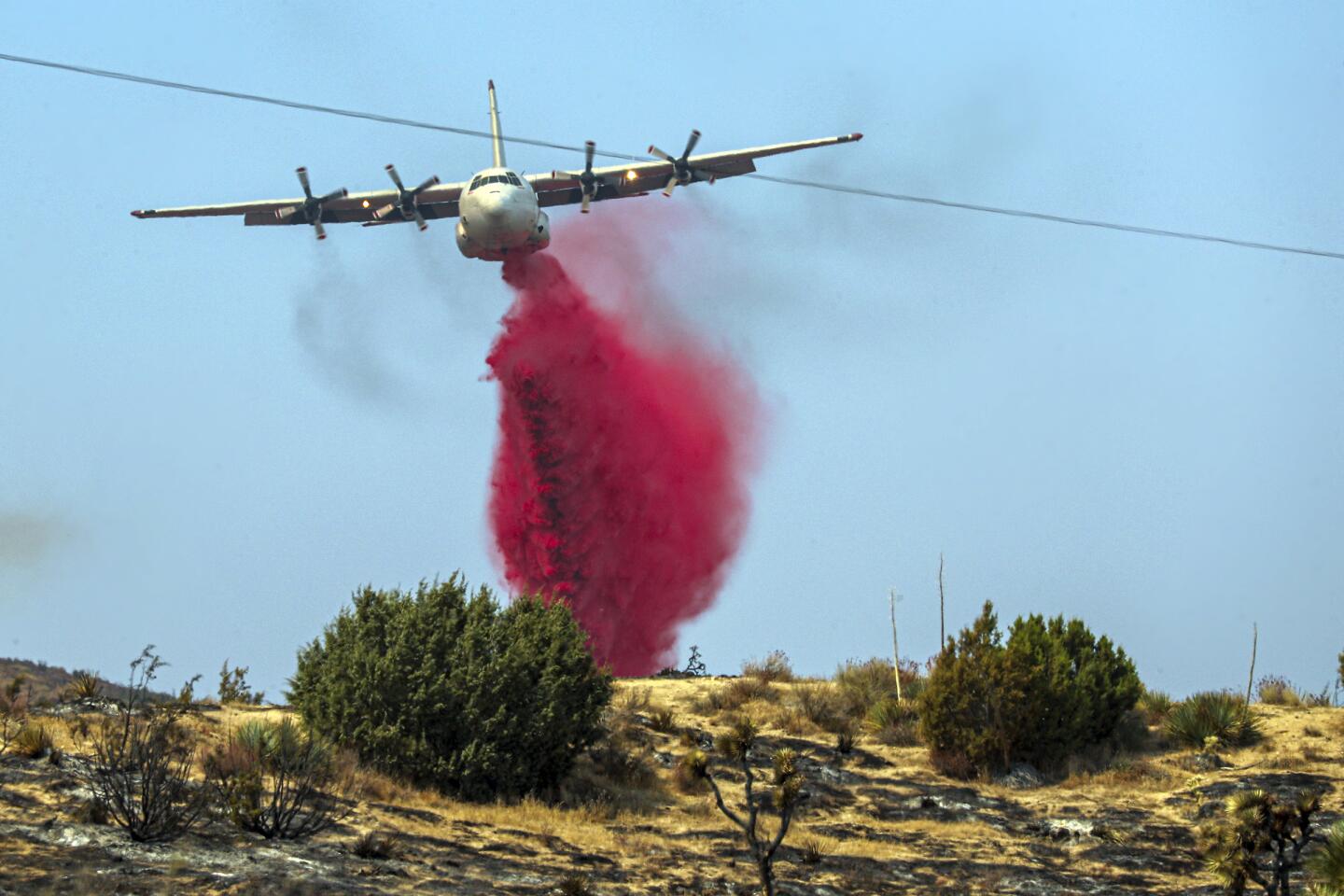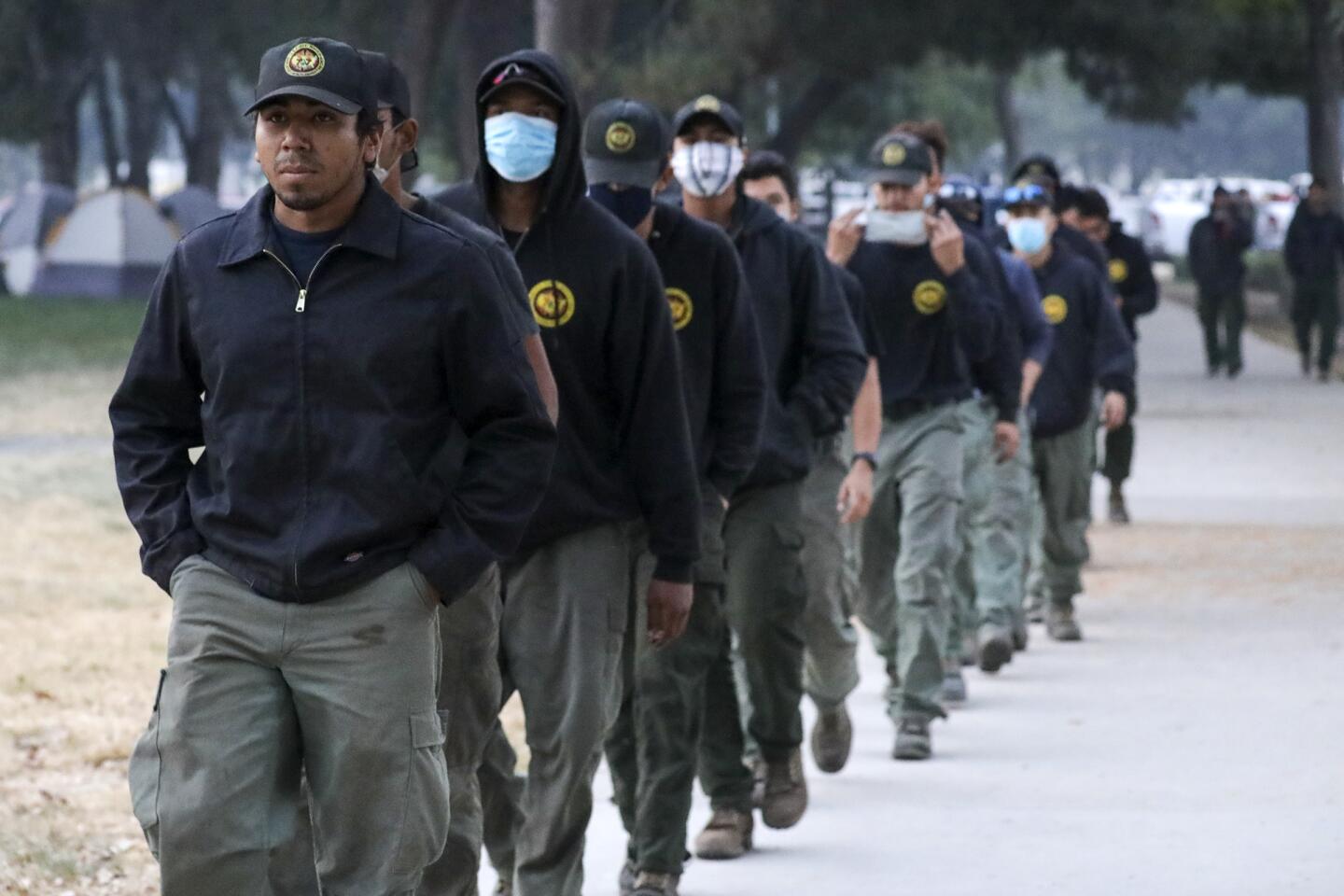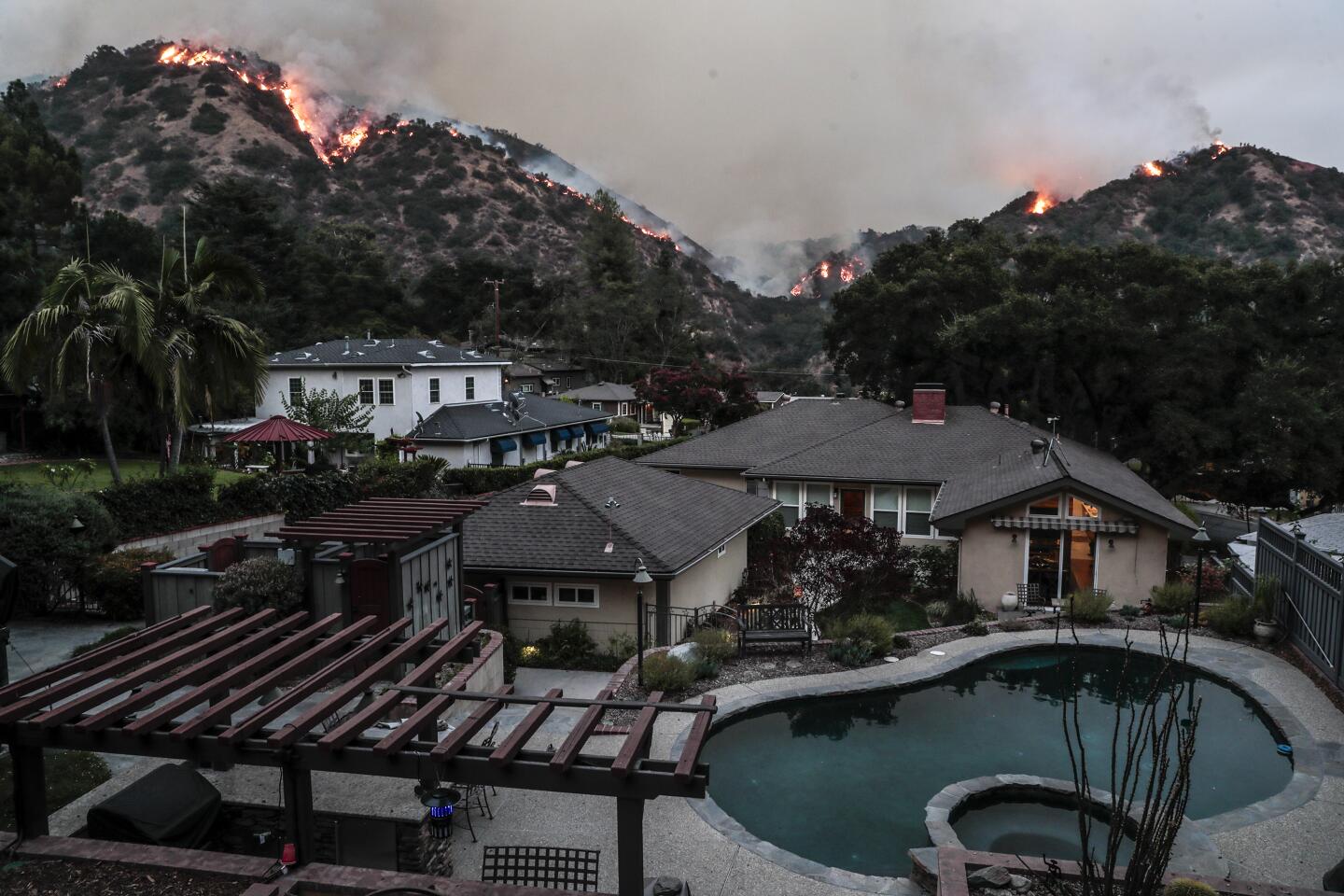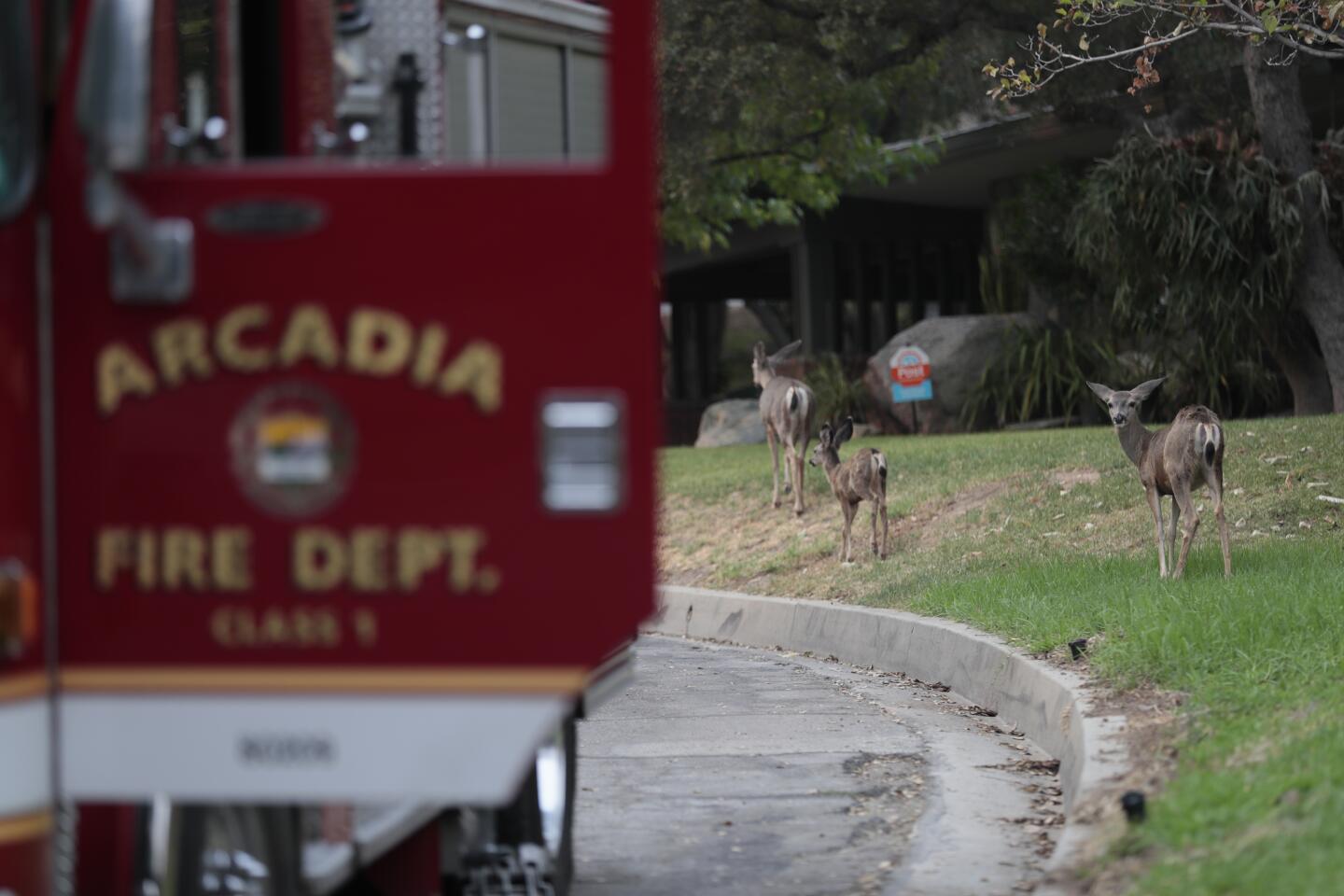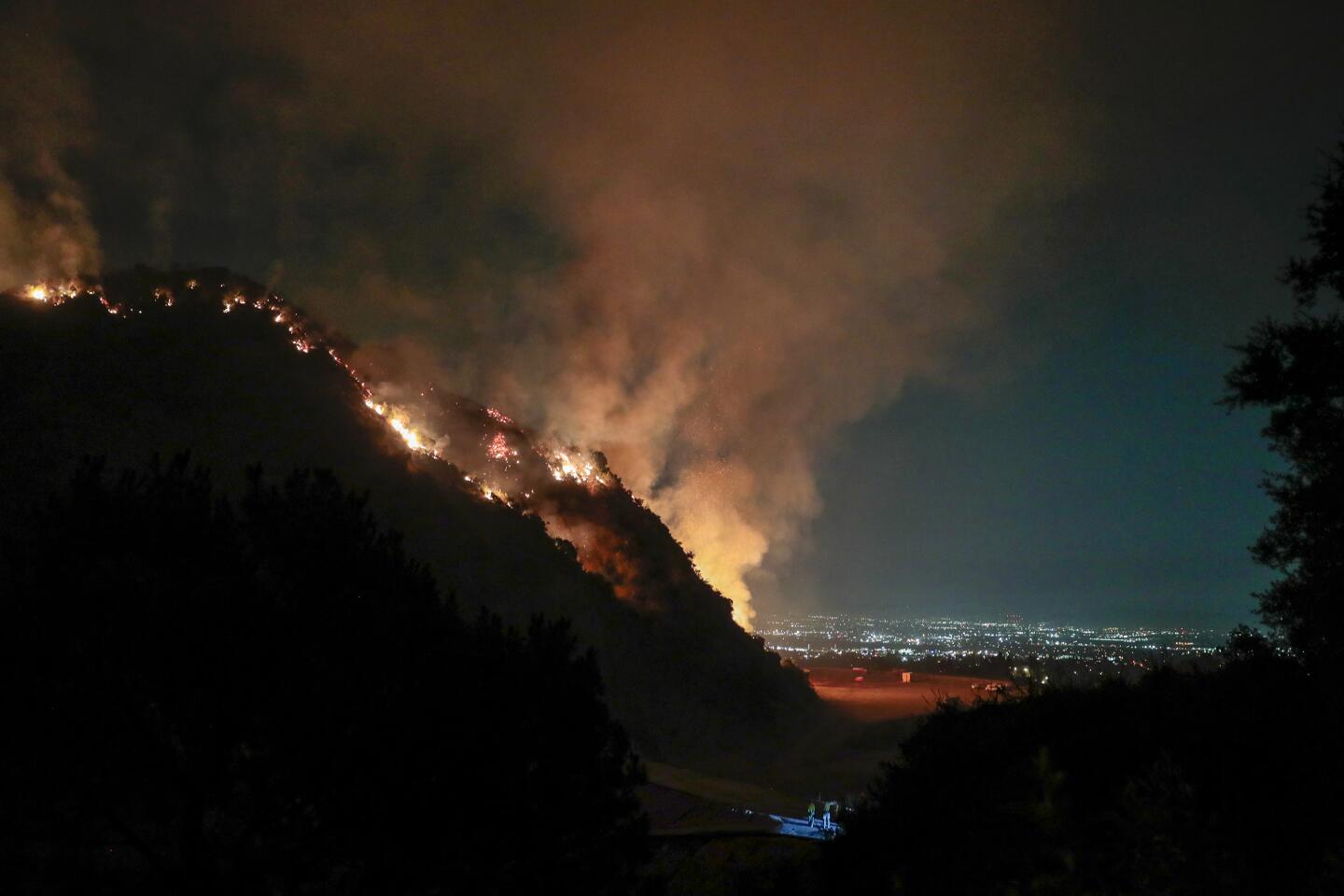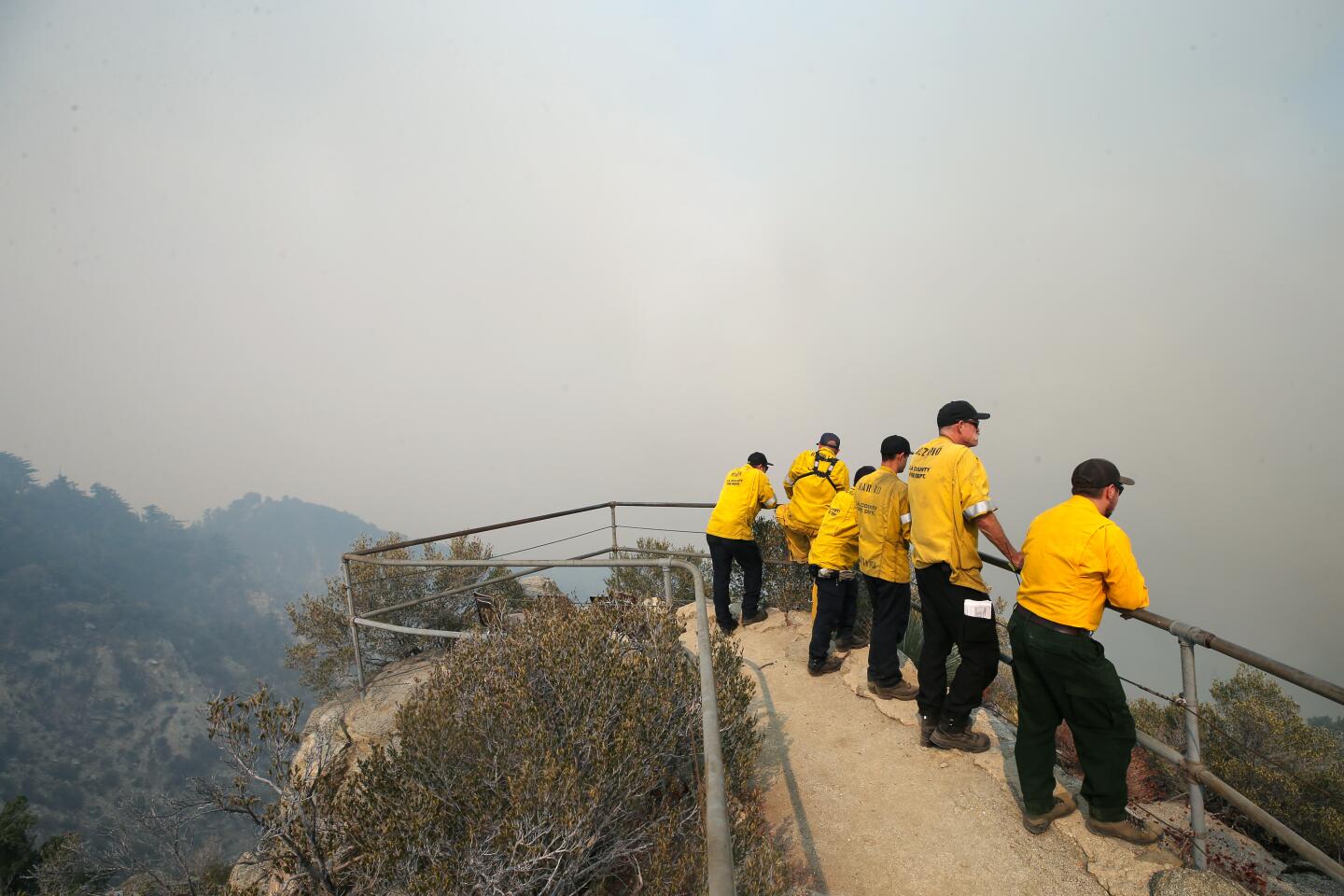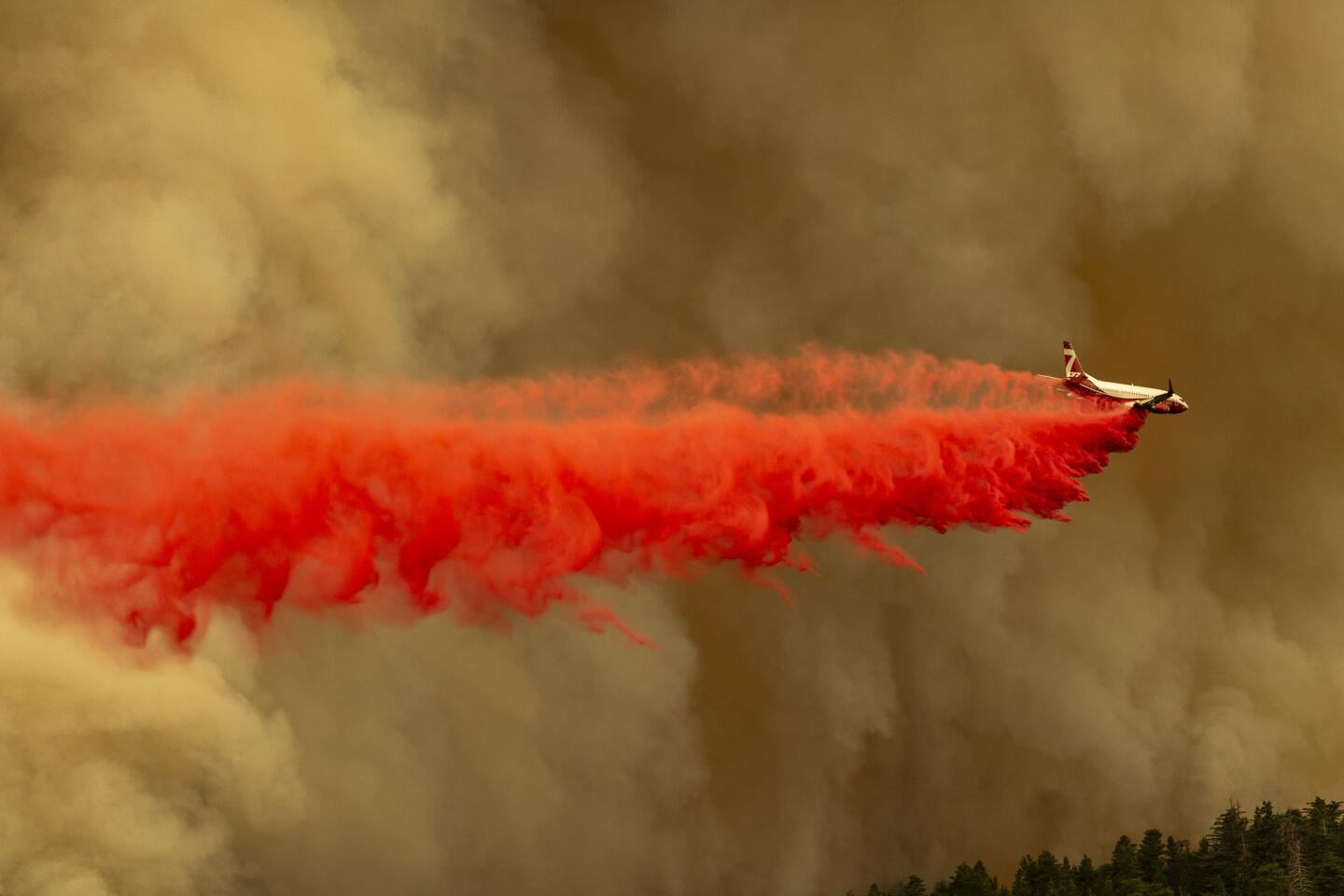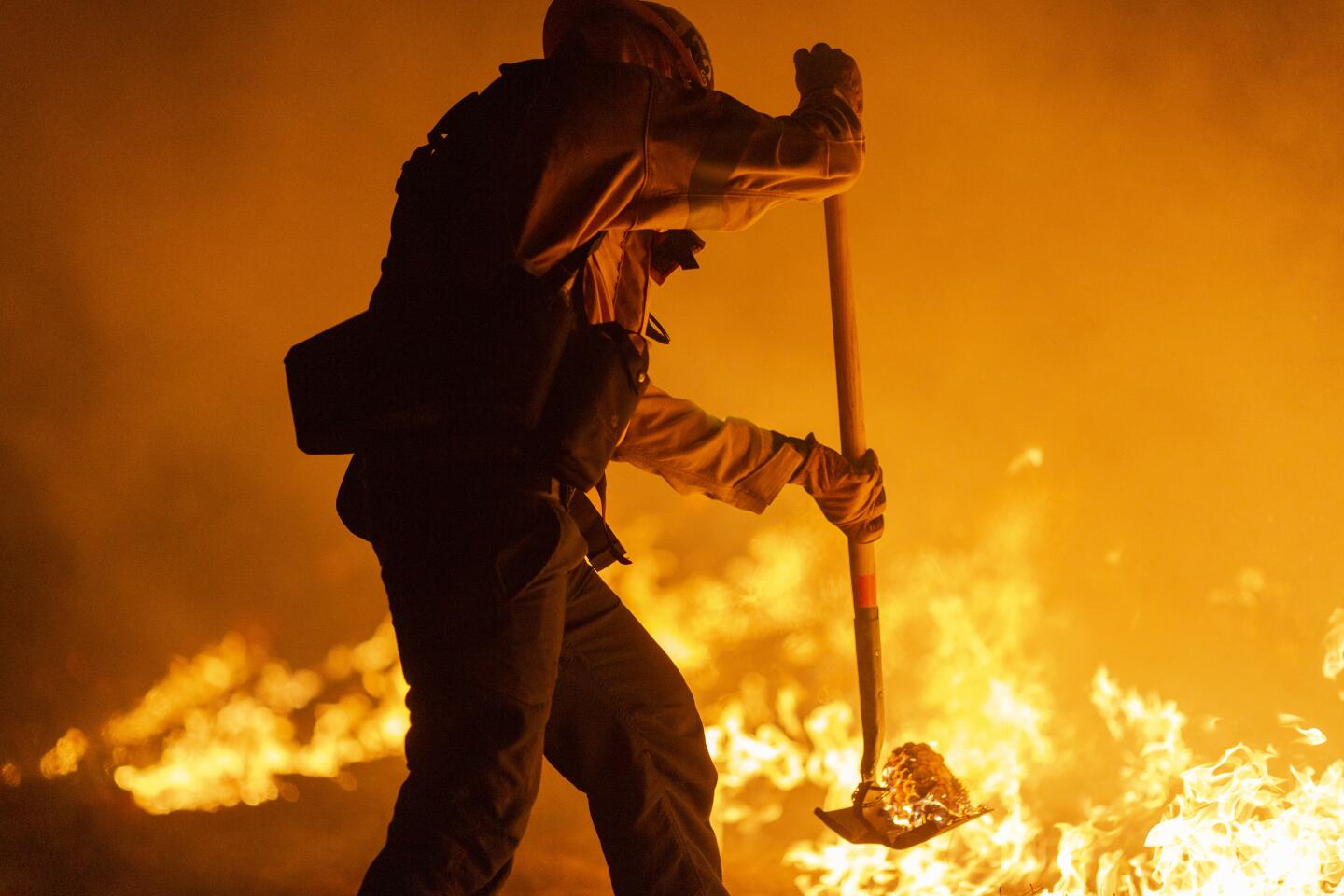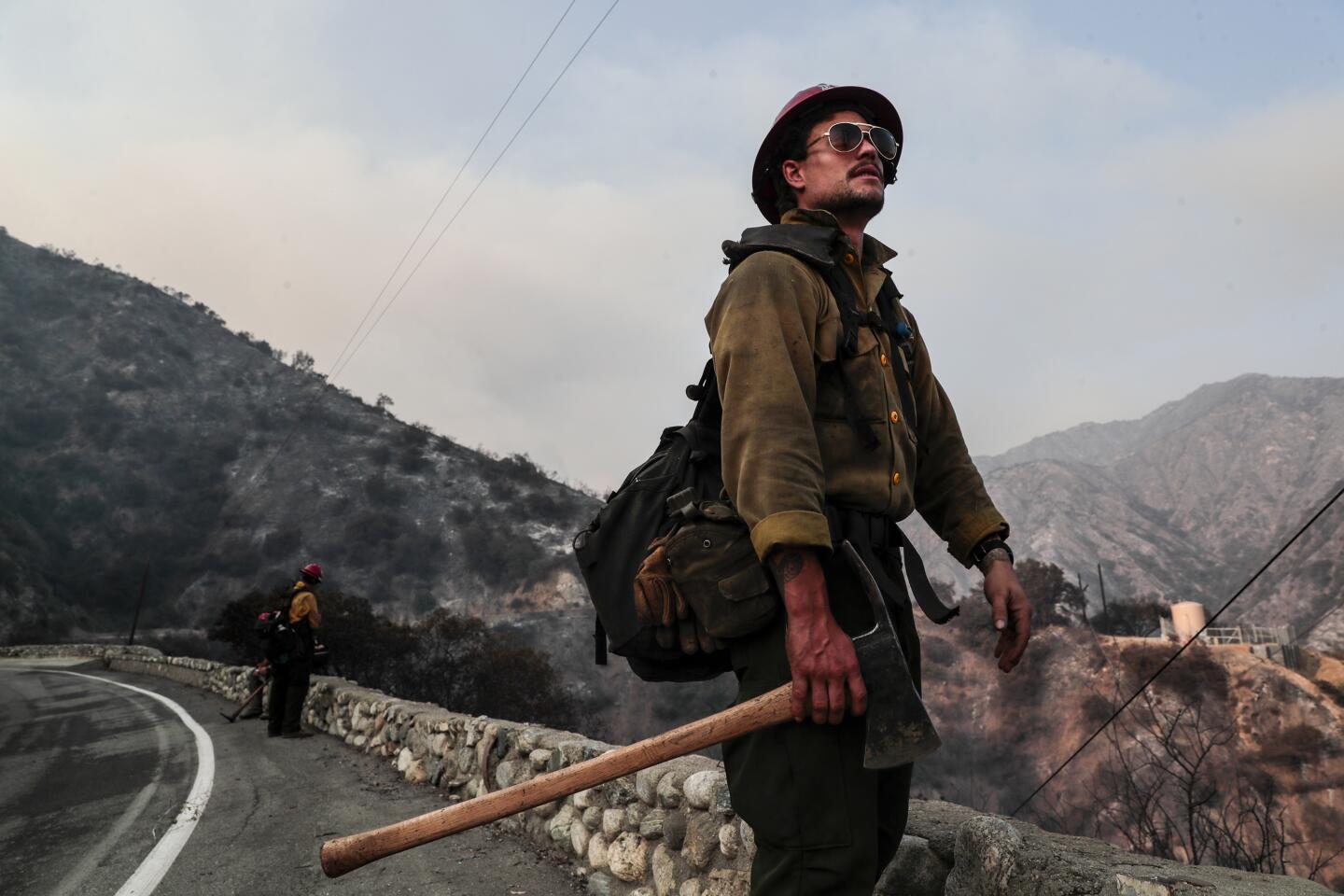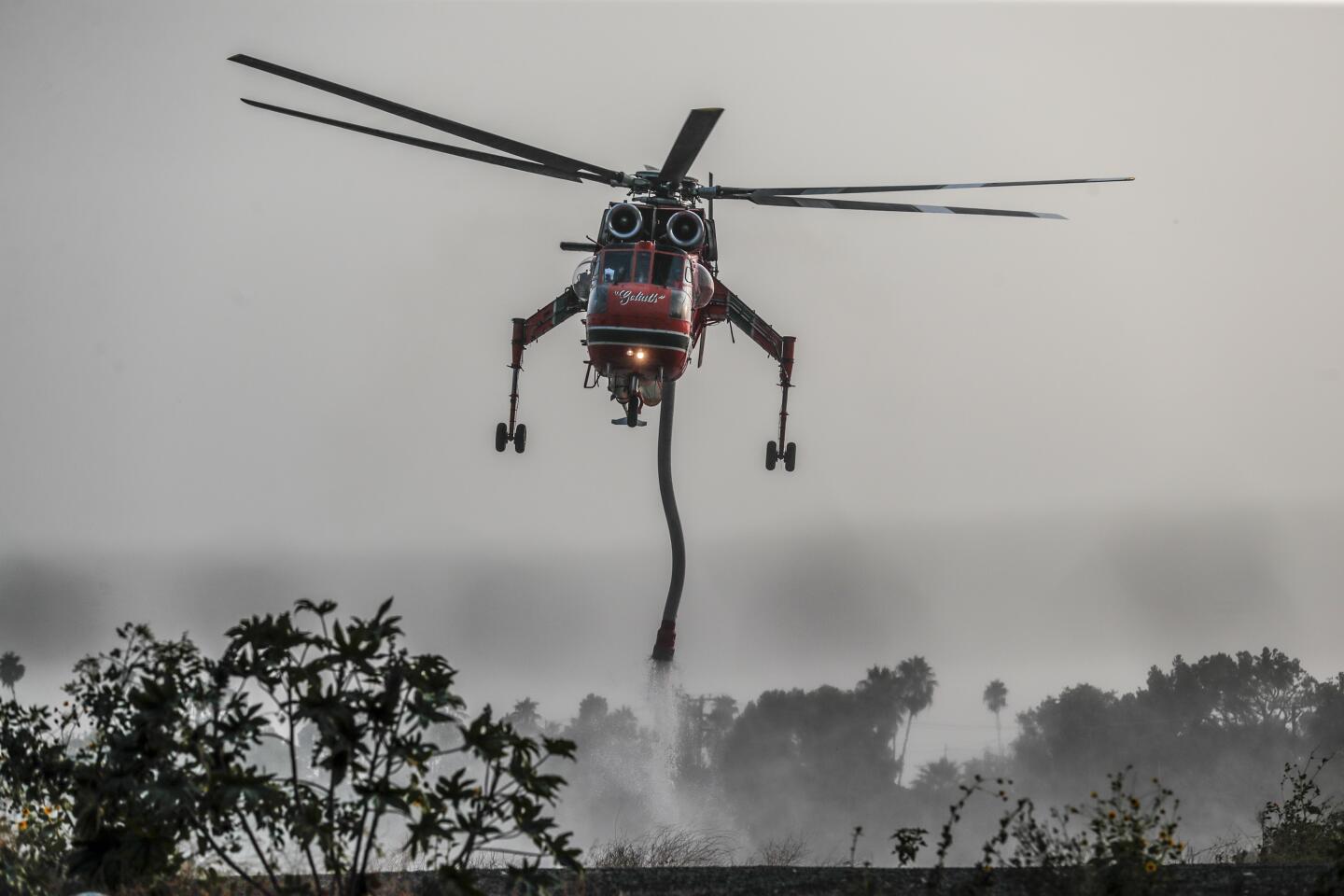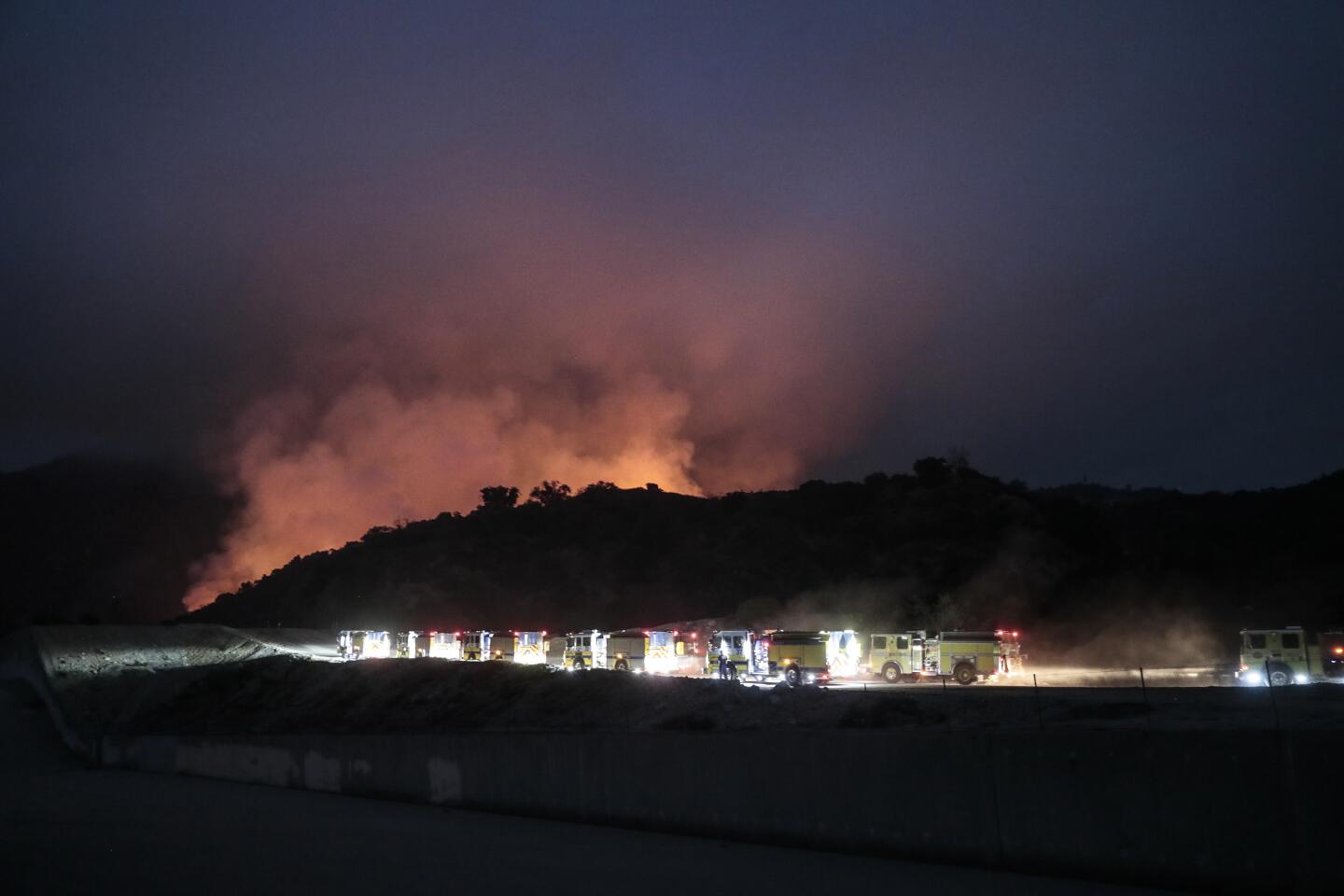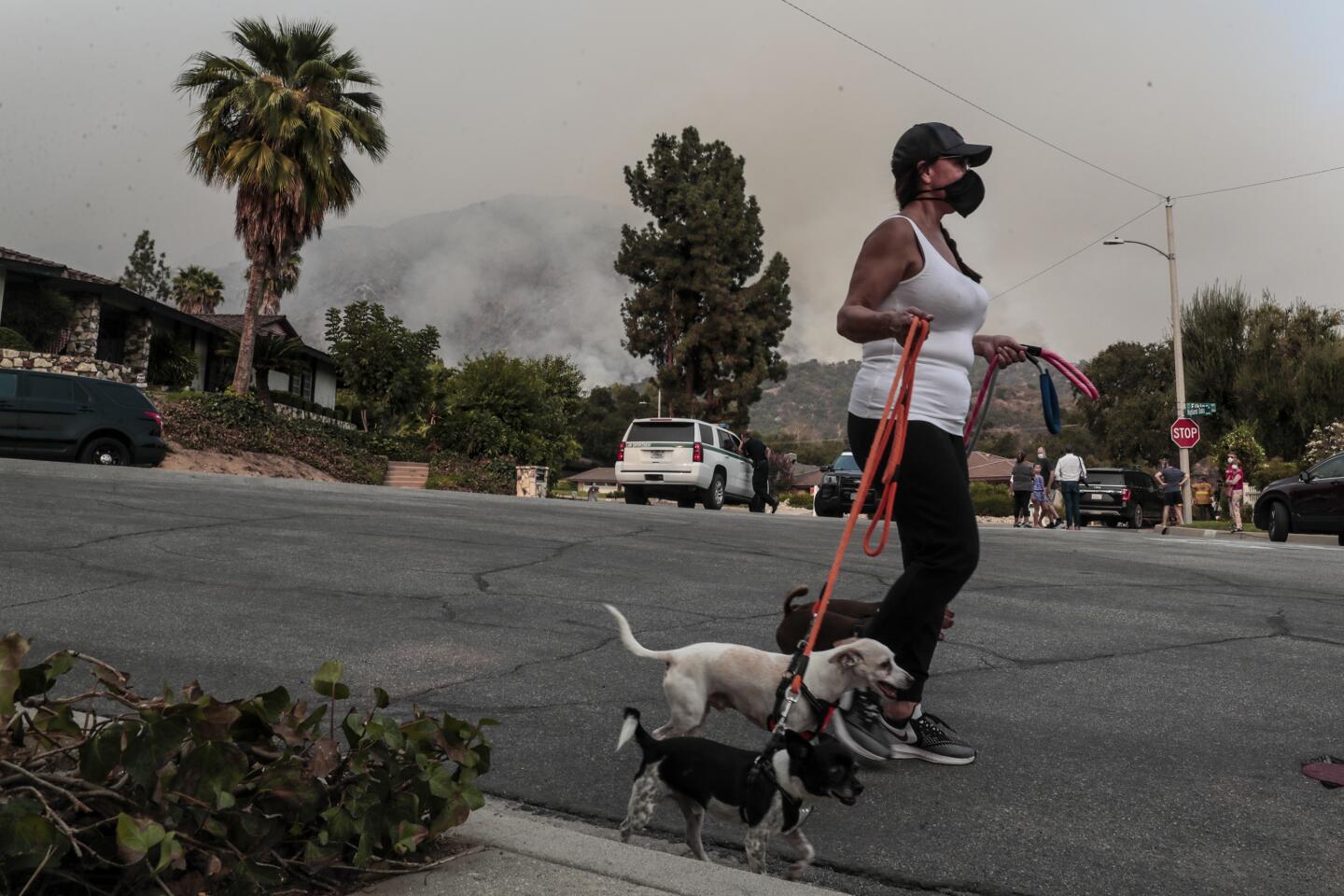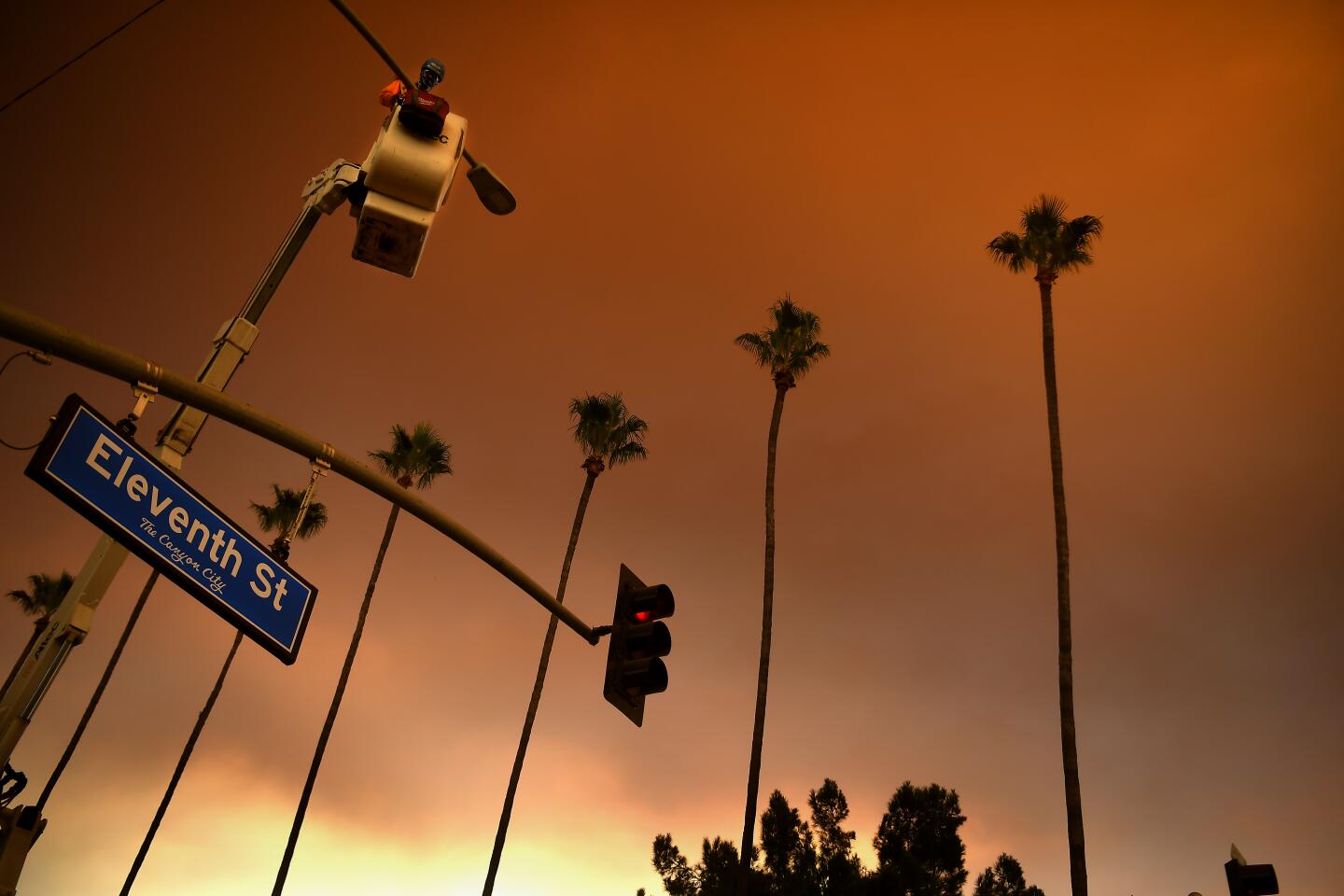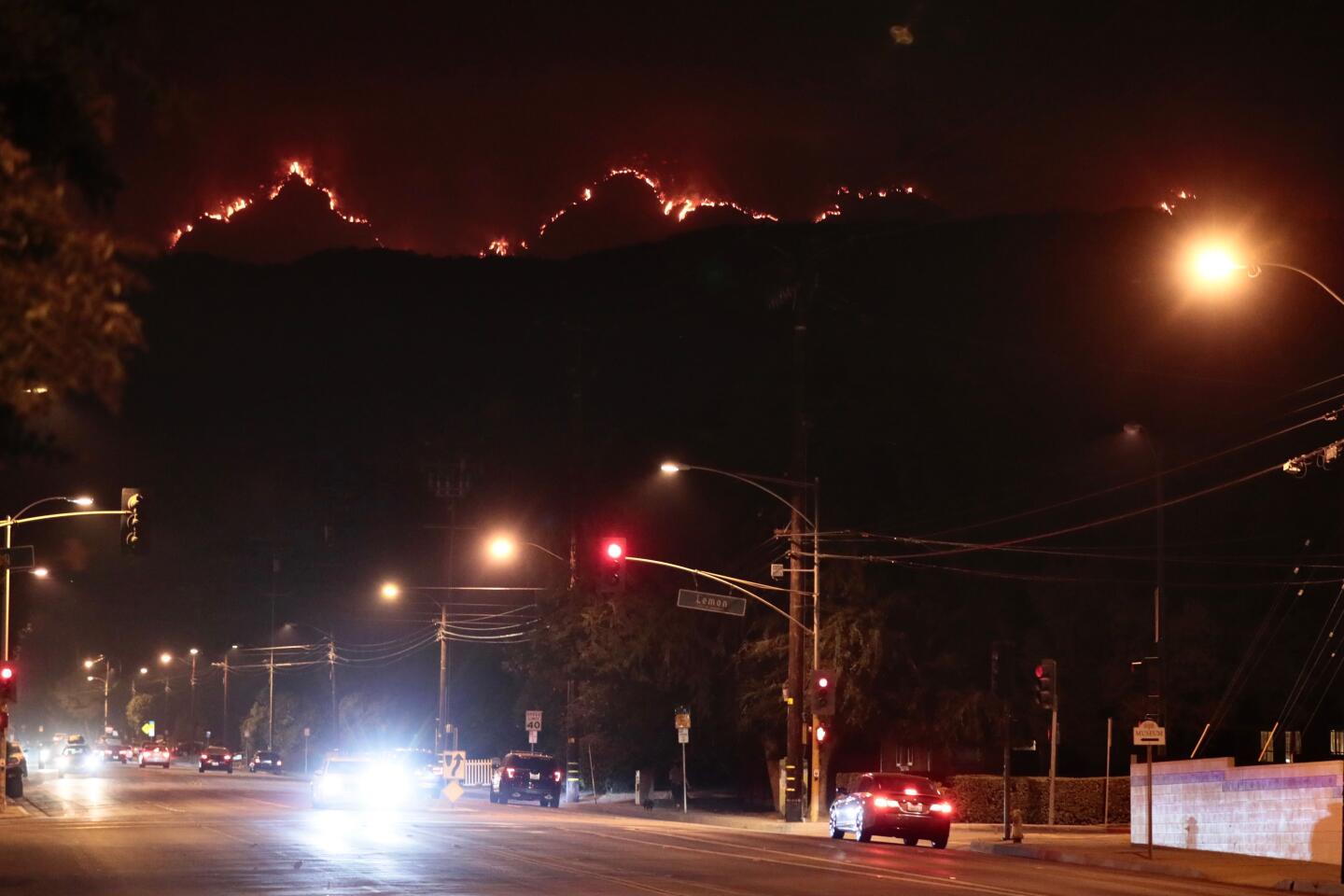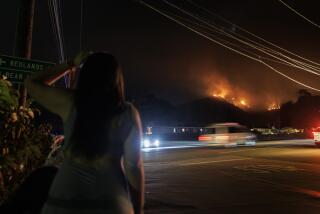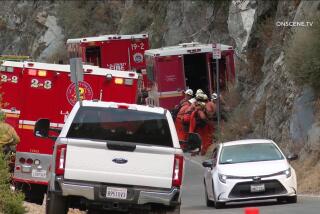The Bobcat fire has made its way into the foothills of the Antelope Valley and is damaging structures and forcing more evacuations.
Vince Pena, unified incident commander with the Los Angeles County Fire Department, said the blaze is threatening property around Juniper Hills and Valyermo.
There has been “structure damage and we expect structure loss,” Pena said at a Friday evening news briefing.
The relentless fire, which started Sept. 6, has now chewed through more than 72,000 acres — doubling its size in the last week.
1/42
Blue Ridge Hot Shots crew members from Arizona work on a backfire operation north of Mt. Wilson on Angeles Crest Highway. (Robert Gauthier / Los Angeles Times)
2/42
Blue Ridge Hot Shots crew members from Arizona join forces with firefighters from Northern and Southern California on a backfire operation north of Mt. Wilson on Angeles Crest Highway. (Robert Gauthier / Los Angeles Times)
3/42
Smoke and ash filter the sunset looking west from Angeles Crest Highway as the Bobcat fire continues to burn. (Robert Gauthier / Los Angeles Times)
4/42
Blue Ridge Hot Shots crew members from Arizona help on a backfire operation on Angeles Crest Highway. (Robert Gauthier / Los Angeles Times)
5/42
Firefighters continue to battle the Bobcat fire north of Mt. Wilson along Angeles Crest Highway. (Robert Gauthier / Los Angeles Times)
6/42
Blue Ridge Hot Shots crew members from Arizona work on a backfire operationon Angeles Crest Highway. (Robert Gauthier / Los Angeles Times)
7/42
The Bobcat fire continues to burn in the Angeles National Forest as seen from the Evergreen Cemetery in Los Angeles on Sept. 21. (Genaro Molina / Los Angeles Times)
8/42
Horses are spooked by the approaching Bobcat fire on 106th Street in Juniper Hills on Sept. 18. (Irfan Khan / Los Angeles Times)
9/42
A resident flees as Bobcat fire approaches Cima Mesa Road in Juniper Hills. (Irfan Khan / Los Angeles Times)
10/42
A Joshua tree burns as the Bobcat fire rages in Juniper Hills. (Irfan Khan / Los Angeles Times)
11/42
A Super Scooper dives behind a house in Juniper Hills to make a water drop. (Irfan Khan / Los Angeles Times)
12/42
The view from Big Pines Highway as the Bobcat fire continues to burn in the Angeles National Forest. (Robert Gauthier / Los Angeles Times)
13/42
A statue sits on top of a house that burned to the ground in Juniper Hills. (Wally Skalij / Los Angeles Times)
14/42
A house on Cima Mesa Road in Juniper Hills burns Sept. 18 as the Bobcat fire continues to rage. (Irfan Khan / Los Angeles Times)
15/42
Mike Gregoryan is frustrated as he is asked to leave his home on Cruthers Creek as Bobcat fire closes in on structures. (Irfan Khan / Los Angeles Times)
16/42
A smokey sunset as the Bobcat Fire continues to burn in the Angeles National Forest. (Robert Gauthier / Los Angeles Times)
17/42
Bear Divide Hotshots cover a U.S. Forestry Department information center Sept. 19 in Wrightwood to protect it from the Bobcat fire. (Irfan Khan / Los Angeles Times)
18/42
A man riding a tractor evacuates Valyermo as the Bobcat fire burns Sept. 18 in Angeles National Forest. (Dania Maxwell / Los Angeles Times)
19/42
Castle Snider, 8, looks on as flames from a control burn are used to reduce fuel near homes in Monrovia as the Bobcat fire continues to burn in the Angeles National Forest. (Robert Gauthier / Los Angeles Times)
20/42
A statue is left charred Sept. 19 after the Bobcat fire roared through Juniper Hills. (Wally Skalij / Los Angeles Times)
21/42
The LA County Fire Camp 9 hand crew rests on Big Pines Highway after working the north flank of the Bobcat fire near Mile High. (Robert Gauthier / Los Angeles Times)
22/42
LaVerne engine 761 arrives to offer defense as the Bobcat fire burns near homes in Monrovia. (Robert Gauthier / Los Angeles Times)
23/42
A fire engine drives into air thick with smoke along Juniper Hills Rd. as the Bobcat fire advances north into the Antelope Valley. (Robert Gauthier / Los Angeles Times)
24/42
Flames crest a hill a few miles from Juniper Hills Rd. as the Bobcat fire advances north into the Antelope Valley. (Robert Gauthier / Los Angeles Times)
25/42
Los Angeles County firefighters standing on outlook as they monitor the Bobcat fire burning in a canyon near the Mt. Wilson Observatory in Angeles National Forest. (Irfan Khan/Los Angeles Times)
26/42
A helicopter fights the Bobcat fire burning close to Mt. Wilson Observatory. (Irfan Khan/Los Angeles Times)
27/42
After spending night at camp Pasadena, firefighters Christina Terrazas, left, and Jason Van Vlymen have their breakfast standing next to their fire truck. Hundreds of firefighters from different agencies fighting Bobcat Fire in San Gabriel mountains above Arcadia, Monrovia and Duarte camp overnight in Santa Fe Dam Recreation Park in Irwindale. (Irfan Khan/Los Angeles Times)
28/42
Roland Pagan surveys the remains of his home on Juniper Hills Drive. (Irfan Khan / Los Angeles Times)
29/42
A plane makes a fire retardant drop in the Antelope Valley. (Irfan Khan / Los Angeles Times)
30/42
Road Runners hand crew from the Angeles National Forest walk single file as they head for breakfast at the Bobcat fire command post at the Santa Fe Dam Recreation Park in Irwindale. (Irfan Khan/Los Angeles Times)
31/42
Flames from a control burn are used to reduce fuel near homes in Monrovia as the Bobcat fire continues to burn in the Angeles National Forest. (Robert Gauthier / Los Angeles Times)
32/42
Curious deer look on as firefighters watch the progress of the Bobcat fire as it continues to burn in the Angeles National Forest. (Robert Gauthier / Los Angeles Times)
33/42
Firefighters look on from Sawpit Canyon as a controlled fire burns on a hillside overlooking the San Gabriel Valley. (Robert Gauthier / Los Angeles Times)
34/42
Firefighters keep watch from an overlook on Mt. Wilson as the Bobcat fire burns in the Angeles National Forest near Pasadena. (Mario Tama / Getty Images)
35/42
A Coulson 737 firefighting tanker jet drops fire retardant to slow Bobcat fire at the top of a major run up a mountainside in the Angeles National Forest. (David McNew / Getty Images)
36/42
Los Angeles County firefighters, using only hand tools, keep flames from jumping a fire break in the Angeles National Forest north of Monrovia. (David McNew / Getty Images)
37/42
Mormon Lake, Ariz. Hotshot Squad team member Jessy Twin looks over charred hillsides after clearing brush. Twin said his crew is on their sixth day of cutting line. (Robert Gauthier / Los Angeles Times)
38/42
A firefighting helicopter refills in a reservoir on Grand View Ave. as crews continue to battle the Bobcat fire. (Robert Gauthier / Los Angeles Times)
39/42
A line of California fire engines head to the flaming Santa Anita Canyon as the Bobcat fire burns near Arcadia. (Robert Gauthier / Los Angeles Times)
40/42
Claudia Alcaino walks her dogs along Highland Oaks Drive as crews continue to battle the Bobcat fire in the nearby Angeles National Forest. (Robert Gauthier / Los Angeles Times)
41/42
A worker installs a street camera along North Azusa Avenue as smoke covers the sky from the Bobcat fire. (Wally Skalij / Los Angeles Times)
42/42
The Bobcat fire continues to blaze in the mountains above Monrovia. (Robert Gauthier / Los Angeles Times)
Strong winds are driving the blaze toward communities in the Antelope Valley, L.A. County Fire Chief Daryl Osby said.
Fire crews are trying to stop the blaze from marching in the other direction — east of Highway 39 — and working to protect Mt. Wilson, home to a historically important observatory as well as numerous communication towers.
Residents in northern foothill communities, including portions of Juniper Hills, Devil’s Punchbowl and Paradise Springs, were placed under evacuation orders earlier in the week as flames moved within a mile of the area.
New evacuation orders were issued Friday for residents in the national forest east of Highway 39, south of East Fork Road, west of Glendora Mountain Road and north of Glendora Ridge Road.
Additional orders were issued for residents south of Fort Tejon Road, west of Longview Road, north of Colley Place and east of 89th Street East, as well as residents south of East Avenue W-14, west of 165th Street East, north of Tumbleweed Road and east of Longview Road.
Orders were also issued for residents south of Pearblossom Highway, north of Big Pines Highway, west of Largo Vista Road and east of 165th Street East.
“Yesterday we saw the fire expand north, to the west and to a pocket to the east,” Angeles National Forest spokeswoman Keila Vizcarra said. “Toward the north end, we have a lot of ‘light and flashy’ fuels that ignite really swiftly and quickly, which is contributing to its growth.”
The Juniper Hills area is home to several ranch houses and consists of low-lying desert terrain, the Forest Service said, which fire crews hope will help rebuff the flames that have been feeding off the forest’s bone-dry vegetation.
The fire’s dramatic spread has raised questions about what — if anything — could have been done to prevent its rapid growth.
Ample fuel, record heat and steep terrain have all been attributed to the fire’s ignition and growth. In a meeting with Gov. Gavin Newsom on Monday, President Trump doubled down on criticism that poor forest management has contributed to California’s record wildfires.
“When you have dried leaves on the ground, it’s just fuel for the fires,” Trump said.
But the Angeles National Forest is just that — a national forest — which means it falls under the purview of the federal government and not the state.
The federal government owns 57% of California’s 33 million acres of forests, Newsom said. State and local governments own 3%, while the remaining 40% is privately owned.
In August, Newsom reached an agreement with the Forest Service in which the federal government will match California’s goal of reducing wildfire risks on 500,000 acres of forest land per year.
The Bobcat fire ignited just weeks after that agreement was signed.
Weary fire crews have made significant progress on the southern end of the fire, which jeopardized several foothill communities, including Arcadia and Sierra Madre. With that side of the blaze all but stopped, the overall containment of the Bobcat fire rose from 3% Thursday to 15% Friday, officials reported.
“Right now, they are feeling tired, but they’re also ready to continue the work that’s been done,” Vizcarra said of the crews, “and they’ve done a lot of good work already.”

